












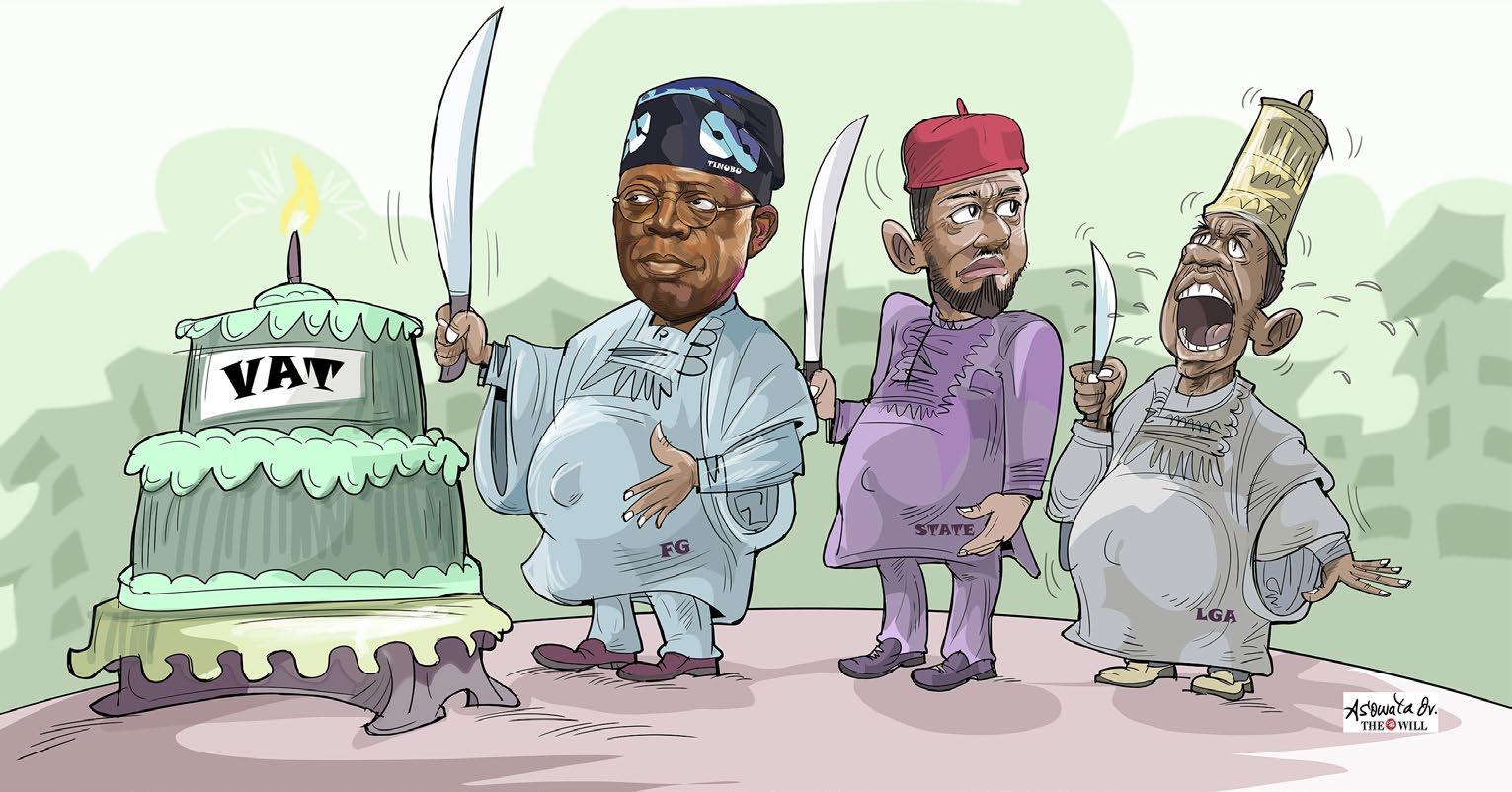


















OnahNwachukwu Editor, THEWILL DOWNTOWN




Daniel Etim Effiong didn’t always train as an actor. His parents chose chemical engineering as his course of study at University, but he knew he wanted to be an actor; ultimately, he had to decide what he wanted to do, which was entertainment. He left his job as an engineer to study filmmaking, writing and directing at AFDA Film School in South Africa and then went to the University of Johannesburg to study filmmaking, which paid off because Daniel Etim Effiong is an actor, writer, producer and director known for his versatile talent. Etim Effiong got his big break after playing Lanre Taiwo in the web series The Men’s Club. His performance was so good that he often got asked if he was acting or if the character he played was his actual personality. Playing that character made him booked and busy, as it showed his talent. These days, he has to be careful what roles he takes on; Etim Effiong says he is now a dad, and his kids watch him on television, so he is cautious about the character he plays.
Read Daniel Etim Effiong’s story on pages 8 to 10.
Our fashion page emphasises choosing the suitable fabric for your body type. On pages 4 to 5, we highlight five helpful tips to assist you in selecting the ideal fabric.
While excessive exfoliating can cause skin irritation, not doing it enough can cause dull and congested skin. The beauty page discusses indicators that it’s time to exfoliate. Scroll to page 12 for this.
Music producer and composer Quincy Jones passed away last Sunday. We pay tribute to him on page 14. His music will continue to play.


Speaking of music, download this week’s playlist on page 16. Simply click on the instructions below the QR codes.
Until next week, enjoy your read.







SUNDAY, NOVEMBER 10, 2024 THEWILL NEWSPAPER • www.thewillnews.com





SUNDAY, NOVEMBER 10, 2024
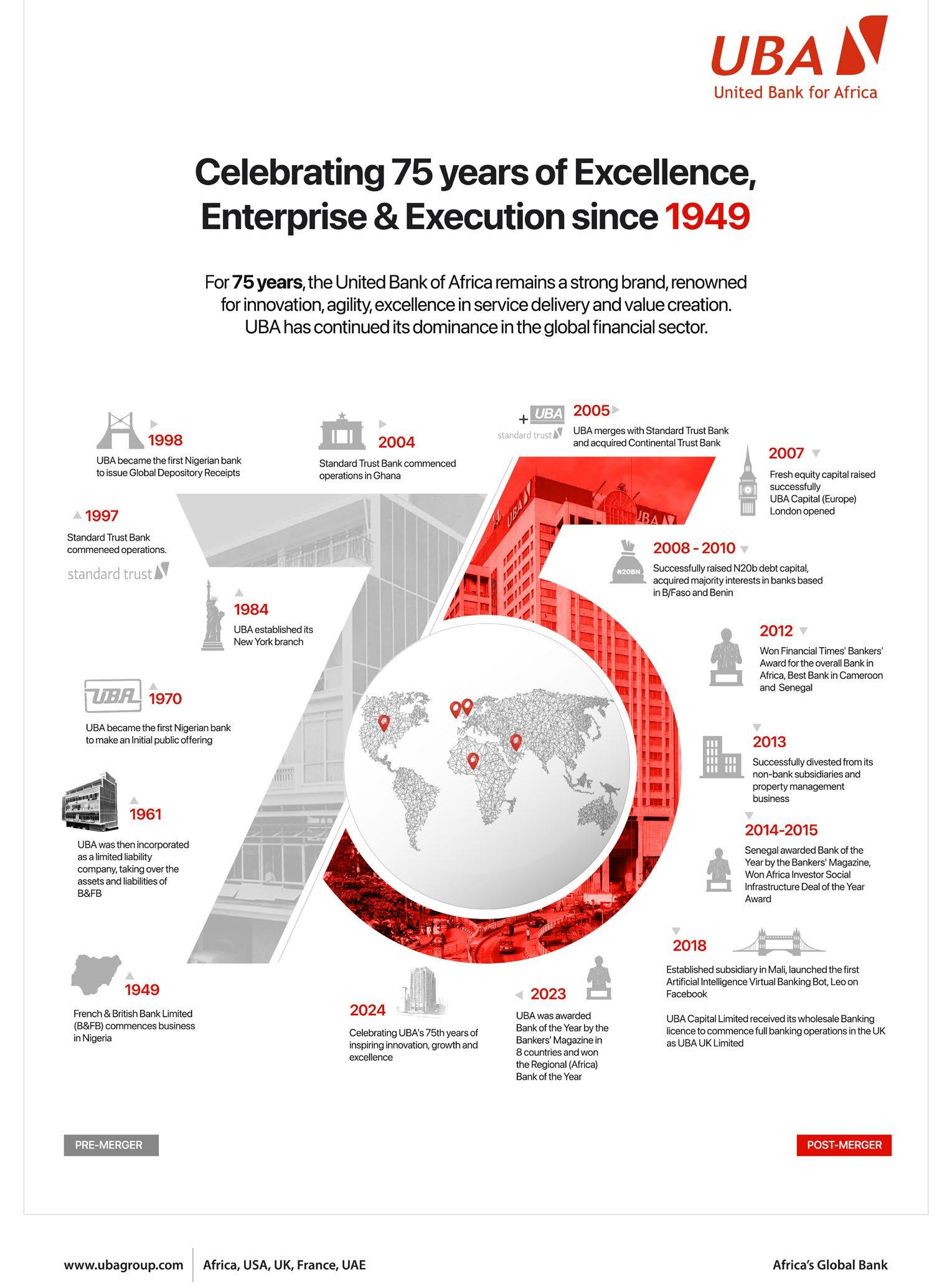


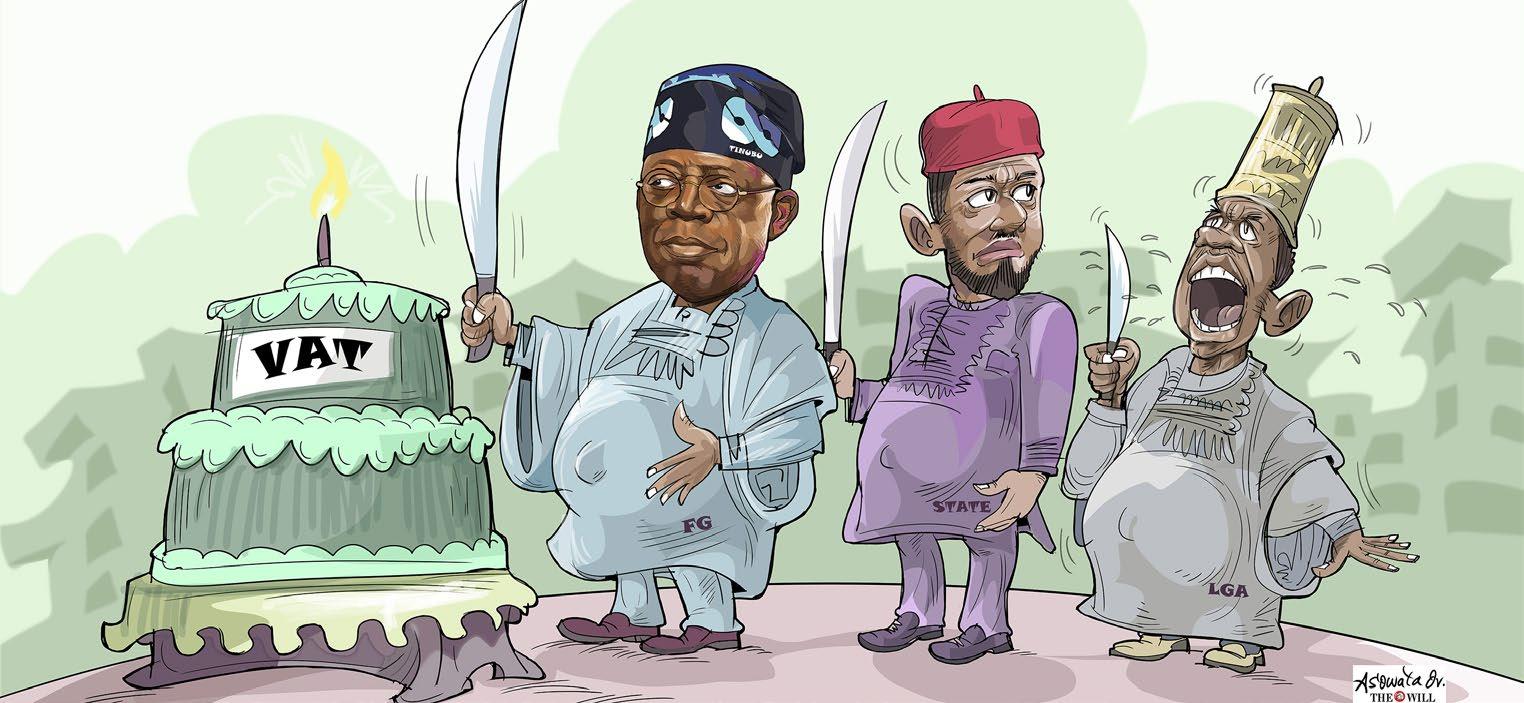
BY AMOS ESELE with UKANDI ODEY, KAJO MARTINS
The maxim, ‘A house divided against itself cannot stand’ may have played a major role in the ongoing tax war between the federal government and governors of the 19 states of the North, some traditional rulers from the region, as well as some northern federal lawmakers who are opposed to the central government’s proposed four reform tax bills before the National Assembly.
President Bola Tinubu had on October 13 asked the National Assembly to consider and pass four tax reform bills, namely, “The Nigerian Tax Bill, the Nigeria Tax Administrative Bill, the Nigeria Revenue Services Bill and the Joint Revenue Board Establishment Bill,” over a year after he set up the Taiwo Oyedele Presidential Committee on Tax and Fiscal Policy Reform in August 2023.
According to checks by THEWILL, the source of discord over the proposals emanated from the FIRS. The appointment of Dr Zacch Adedeji as Executive Chairman of the agency is said to have unsettled some entrenched interests in the agency.
To make matters worse, Adedeji is said to have ‘offended’ those in-house experts, who expected to be consulted and carried along on the new tax reforms, by his decision to consult the renowned ‘Big Four’ accounting, auditing consulting firms, namely PWC, KPMG, Ernst and Young
and Deloitte, on best practices for progressive tax reforms in Nigeria. The last tax reform in the country was done in 1993. An urgent need to carry out a comprehensive tax overhaul was the major reason that Adedeji decided to consult the four firms.
“Some of these entrenched interests in FIRS were the ones who started the disinformation by telling governors in the North who they had access what is really not,” a dependable agency source told this newspaper.
According to the source, “The tax reform bills are a 256page document and all that these interests within chose to misinterpret and misinform their people about what does not exceed one page of the document and that is the Value- Added Tax, VAT. They deliberately sold the idea that the derivation principle in the VAT bill will punish states that do not produce anything whereas VAT is a consumption tax.”
Expatiating further, the source who asked for anonymity, gave an example with a producer-consumer matrix. “That 100 industries produce goods, in say Ogun State, does not mean that all the goods will be consumed in Ogun. Assuming the goods are taken to Kano, sold and consumed there by its very large population, that means VAT for goods consumed in Kano but produced in Ogun.
“But as soon as the disinformation went out, the reaction from the supposedly affected quarters was swift and acerbic.”
On Monday, October 28, 2024, the Northern Governors Forum (NGF) rejected the proposed Tax Reform Bill. The Governors of Zamfara, Borno, Bauchi, Adamawa, Kogi, Yobe, Gombe, Kaduna, Nasarawa and Kwara States attended the meeting, while the governors of Kebbi, Taraba and Niger States were represented by their deputies and secretaries to their state governments. Traditional rulers from the region, led by the Sultan of Sokoto, His Eminence Muhammadu Sa’ad Abubakar III, attended the meeting, too.
As it turned out, the VAT, one of the four proposed taxes, was the point at issue. The gathering frowned at the proposed amendment to the distribution of Value Added Tax (VAT) to a Derivation-based Model, saying the bill was antithetical to the interests of the North and other sub-nationals. They called on members of the National Assembly to oppose the bill on the premise that it will jeopardise the well-being of their people.
According to Governor of Gombe state, Mohammed Yahaya, who read the communique at the end of their meeting, “the contents of the Bill are against the interests of the North and other sub-nationals, especially the proposed amendment to the distribution of Value Added Tax (VAT) to a Derivative-Based Model. This is because companies remit VAT, using the location of their headquarters and tax office and not where the services and


goods are consumed. In view of the foregoing, the Forum unanimously rejects the proposed Tax Amendments and calls on members of the National Assembly to oppose any bill that can jeopardise the well-being of our people.”
Despite the presidency’s reassurance that the proposed four bills are not targeted at the North, but new policy initiatives aimed at streamlining Nigeria’s tax administration processes, enhancing efficiency and eliminating redundancies across the nation’s tax operations, the North stuck to its guns.
Two days after their meeting, the National Executive Committee, NEC, chaired by Vice President Kashim Shettima, met and asked the federal government to withdraw the bills from the National Assembly to make room for wide consultations. At the meeting, the state governors from the North insisted that the bills were anti-North.
Reacting to the call to withdraw the bills, President Tinubu said that the legislative process on the Tax Reform Bills before the National Assembly will continue and urged those opposing the bills to make inputs during its public hearing. He welcomed further consultations and engagement with key stakeholders to address any reservations about the bills while the National Assembly considers them for passage.
Tinubu said the committee worked for over a year and received inputs from various segments of the society across the geo-political zones, including trade associations, professional bodies, different ministries and government agencies, governors, traders, students, business owners and the organised private sector.
Special Adviser to the President on Information and Strategy, Bayo Onanuga, who took time to explain the contents of the four bills, said the Tax Bills seeks to eliminate multiple taxation and make Nigeria’s economy more competitive by simplifying tax obligations for businesses and individuals nationwide.
According to Onanuga, the Nigeria Tax Administration Bill (NTAB) proposes new rules governing the administration of all taxes in the country. Its objective is to harmonise tax administrative processes across federal, state and local jurisdictions to ease taxpayers’ compliance and enhance the revenue for all tiers of government.
The Nigeria Revenue Service (Establishment) Bill seeks to re-establish the Federal Inland Revenue Service (FIRS) as the Nigeria Revenue Service (NRS) to better reflect its mandate as the revenue agency for the entire federation, not just the federal government.
The Joint Revenue Board Establishment Bill proposes creating a Joint Revenue Board to replace the Joint Tax Board, covering federal and all state tax authorities. The fourth bill will also establish the Office of Tax Ombudsman under the Joint Revenue Board, protecting taxpayers’ interests and facilitating dispute resolution.
“The bills’ overarching objective is to effectively coordinate federal, state and local tax authorities, thereby eliminating the overlapping responsibilities, confusion and inefficiency that have plagued tax administration in Nigeria for decades,” said Onanuga.
NORTHERN OPPOSITION PERSISTS
Despite the presidential assurance, the North is not backing down. Checks show that governors and many federal lawmakers are mobilising to frustrate the bills
at the National Assembly. Senator Ali Ndume, who has been very critical of the bills, is said to be the rallying point for other lawmakers opposed to the bill. The Senator representing Borno South at the NASS, referred to the bill as “dead on arrival at the National Assembly” if the president fails to heed the call of the Northern Governors Forum and the NEC to do more consultation and carry Nigerians along.
But how far the mobilisation would go is yet to be seen. Although most of the 19 state governors attended that Monday, October 28 Northern Governors Forum, those who stayed away appeared to have conveyed a different message by their non-attendance. The states are six, namely, Kano, Katsina, Jigawa, Sokoto, Benue and Plateau. States like Plateau and Benue, in particular, do not seem to know what the opposition to the reform bills is all about, according to THEWILL’s checks. A senior government official from one of these states even asked to be briefed on the meeting and the issues raised there. Then at the House of Representatives, nothing seems to be afoot for now. This appears to be because opposition to the President may not be as strong as Ndume is making it seem. Moreover, there is a political capital to be drawn by President Tinubu, a source told this newspaper. It derived from last month’s overture by the President to the House. THEWILL recalls that last month President Tinubu bowed to pressure from the House of Reps to withdraw the Commander of the Order of the Niger, CFR, national honours for the Speaker and bestowed on him the second highest national honour of Grand Commander of the Order of the Niger, GCON. That bestowal was against historical precedence. Past Speakers since 1999 had always received the CFR award. The concession was part of high stakes politics which held an undertaking.
Efforts to get comments from the spokespersons of both chambers of the NASS failed as they did not respond to phone calls from THEWILL correspondent. The spokesperson of the Senate, Adaramodu Adeyemi did not pick up multiple calls. Also, the Deputy spokesperson for the House of Reps, Phillip Agbese, failed to answer his phone.
Besides, Senator Ndume appears to be facing a backlash for his stand. An aide who spoke under anonymity hinted at a plan by his party, the All Progressives Congress, APC, to sponsor his recall by his constituents. Temporary respite came his way because of the intervention of the Borno Elders Forum, which is standing by him. Felix Morka, the National Publicity of the APC, did not respond to calls for comments.
The bills’ overarching objective is to effectively coordinate federal, state and local tax authorities, thereby eliminating the overlapping responsibilities, confusion and inefficiency that have plagued tax administration in Nigeria for decades
A source at the FIRS told this newspaper that what he referred to as ‘hidden issues’ may actually be fuelling the opposition of stakeholders from the North, regardless of the explanation on VAT.
“For some of these states where religion influences policy decisions on some vatable items like alcohol which a relevant agency regularly destroys, consumption tax may fall on deaf ears. Yet some of these states have a very large population that could consume products from across the country and so stand to benefit more because statistics from the National Bureau of Statistics shows that VAT contribution comes from consumption.”
Explaining at the weekend why President Bola Tinubu would not withdraw the bills as demanded by NEC, Northern Governors and their traditional rulers, Coordinating Director, Compliance and Enforcement at the FIRS, Matthew Mojibola said that taking such a step on the bills could pose a danger to the economy.
“Bills are not laws until they are passed, meaning that the bills could be amended and changed by the National Assembly, which is empowered by the Constitution to do so. Therefore, withdrawing them is not the solution. Let those who are against it go to the National Assembly and present memoranda during public hearings. VAT which is attracting so much opposition is only one part of the bills having over 200 sections.”
He explained that the VAT bill is based on fairness whereby everybody contributes to the ‘baking of the cake’ just as everybody participates in sharing. Still pursuing his arguments on the fairness in VAT, Mojibola, said that the majority of VAT comes from services or fast consumer goods like sugar, milk, seasoning and phones consumed by both the poor and rich, unlike luxury items like vehicles, iPhone, which contributes little in comparison. “So, you see VAT is derived from what everybody consumes. Indeed, the issue of derivation is being overplayed. Derivation is one of the ways used in sharing VAT revenues. Equity and population are also used. Under the new bill, 60 per cent is tied to derivation, 20 per cent to equity and another 20 per cent to population. That is the basis of fairness in the bill. This way, states that find themselves getting less on derivation are compensated by the other 40 percent. Many people are yet to read the bills and are basing their decisions on hearsay.”
Insisting that the four bills are designed to ensure that people pay less than in the past, as more cuts have been done in the area of food, medications, assets, public transportation, children and schooling items, Mojibola ended on a rhetorical note: “Making all those opposed to the bill happy is not possible. Making everybody agreeable is feasible. The way to do this is to educate everyone about the provisions of the bills.”
Educating everyone about the bills is a task that must be done because of their ultimate benefits, according to Senator Shehu Sani in his reaction to the growing opposition from the North. Arguing that Senator Ndume’s trenchant comments do not reflect the position of the North, let alone that of Nigerians, the Senator who represented Kaduna South in the eight NASS, said, “People should put sentiments aside and read the bills carefully. They are a comprehensive effort and bold move to harmonise and simplify tax administration and streamline their enforcement and enforcement.” He called on the 19 Northern governors to promote their passage.
President Bola Tinubu decorates acting Chief of Army Staff, Maj. General Olufemi Olatubosun, Oluyede with his new rank of Lt. General as Minister of Defence, Mohammed Badaru (right) looks on, during a ceremony held at the State House, Abuja, recently.

TheAttorney-General of the Federation and Minister of Justice, Lateef Fagbemi, SAN, has said President Bola Tinubu ordered the release of the minors arrested during the #EndBadGovernance protest on compassionate grounds.
THEWILL reports that President Tinubu on Monday directed the immediate release of all minors arrested during the #EndBadGovernance Protest in August. They were released along with other protesters on Tuesday, following the withdrawal of the charges against them by the Federal Government.
Speaking on Thursday in Abuja after the commissioning of a new office complex built by an Abuja-based law firm, the Law Corridor, the AGF emphasised that no law in the country forbade the prosecution of minors. He stated, ìNo law in this country says a minor cannot be tried, and I have also heard suggestions that they should go to a family court.
The Minister of Aviation and Aerospace Development, Mr Festus Keyamo (SAN), has said Air Peaceís strong performance in the aviation industry is a testament to Nigeriaís global aviation potential. The minister made this disclosure at the 10th-anniversary celebration of Air Peace held at the Eko Hotels and Suites in Lagos. Keyamo commended Air Peace, the leading airline in Nigeria and the West African subregion, for its world-class operations, which have continued to elevate the countryís standing in the global aviation industry. He assured that the federal government would continue to extend its support and backing to the airline to ensure its success. The minister gave the commendation and assurance: ìAir Peace is a proud ambassador of the Federal Republic of Nigeria. As a government, we are proud to support our local airlines. We are proud to support Air Peace in particular because it flies our flag very high all over the world,î the minister said. ìTheyíre rubbing shoulders with some of the biggest airlines in the world and that is from a local entrepreneur here so they deserve all the praise, all the support.î
BY FELIX IFIJEH
President Bola Tinubu has granted full powers to ministers of state, to supervise the agencies under them, marking a significant shift in practice.
Earlier, files pertaining to departments and agencies under their supervision were sent by their permanent secretaries to the senior ministers.
An official in the office of the head of service of the federation, confirmed exclusively the approval of TheCable.
ìThe president was not pleased with the prevailing governing framework in which ministers of states were just ministers in name. The president believes ministers of state should have the right to make decisions and direct action within their areas of responsibilityî, the source said.

ìThe study of the law and the constitution leaves you no other conclusion than that the federal high court has jurisdiction in matters bordering on treason and related issues. So, whatever the situation, the president has closed the chapter with his decision to have these young men released.
ìThe president was very compassionate; he is a father and a grandfather. If you look at the facts in the possession of the security agency, you would marvel.
ìBut the president said, despite all this, ëI have children and grandchildren,í and that motivated his passion to release them and also enable them in some ways. So the credit goes to him for showing compassionate consideration in releasing the young chaps.î
According to the minister, Air Peaceís global standard and innovative operations coupled with some of the governmentís efforts are beginning to attract attention to the countryís aviation potential to the point that international lessors and financiers are anxious to cooperate with airline operators in Nigeria on dry leasing and other financial arrangements. ìWe got a letter yesterday inviting all of us to Ireland in January. Because of what we have done in the last few months since we came to office, the collection of the leading aircraft lessors and financiers in the world have invited us to a meeting in Ireland in January. They want to start discussing at the highest level with Nigerian operators the business of aircraft leasing and financing. We are on the right path and all thanks to people like Allen Onyema.î
The minister highlighted the tough aviation terrain in the country, which has led to the death of numerous airlines in the past. ìIf you look at the history of airlines in Nigeria, it is difficult for them to survive more than 10 years and still look healthy. We have a history of great mortality of airlines; more than a hundred airlines in the last 40 years or so and I am sure you all remember from the Concord to the Zenith to Okada to the Bellviews to the ADCs,î Keyamo said. Air Peace has however bucked this trend by surviving for 10 years and still going strong. ìHere you have the Air Peace, after 10 years still looking strong, still looking healthy, and actually on the rise rather than on the decline.î
THEWILL recalls the valedictory message of Festus Keyamo, SAN, who as Minister of State for Labour and Employment, told former President Muhammadu Buhari in 2023, that the duties of the Minister of State were really not defined while highlighting his limitations.
Ministries with ministers of state include agriculture and food security, defence, education, FCT, foreign affairs, health, petroleum (oil), petroleum (gas), humanitarian and poverty reduction and womenís affairs.

Others are works, regional development, labour and employment, finance, trade and investment and housing and urban development.
Election in Ademola Adeleke, his Kogi counterpart, Usman Ahmed Ododo, the InspectorGeneral of Police, Kayode Egbetokun and the Chairman of the Independent National Electoral Commission, Professor appear to be determined to ensure that the
at least 22,239 Police personnel would be disclosed this at a meeting organised by the Independent National scuttle represented by the Assistant Inspectorcalled on stakeholders
He said, “The Nigeria Police and other supporting security agencies responsible for providing security in the forthcoming election have a responsibility to solidly synergise and work as a formidable team to identify and nip in the bud, all security threats, provide water-tight security at the polling stations as well as all
“The security of the voters, the electoral officials, the electoral materials and the general public will have to be effectively provided before, during and after the election. This can be efficiently achieved by concerted covert and overt operations by the synergized security agencies assigned for the election duties.
“In order to deliver adequate election security, the Nigeria Police, apart from additional manpower from sister agencies, is going to

“All stakeholders should eschew violence, avoid the do-ordie approach, should not employ thuggery and play the game according to the rules in the spirit of sportsmanship that will enable the loser to lose gallantly and the winner to be magnanimous in victory. It should be stated that violators of electoral laws run the risk of diligent prosecution. He that loses today may win tomorrow- there is always hope for the future.
On his part, INEC chairman, Prof. Yakubu, who noted that the 2024 governorship election is of global interest, disclosed that sensitive election materials will arrive in the state on Tuesday.
Disclosing that the mock accreditation exercise in 12 polling units across six local government areas in the three senatorial districts of the state was successful, Yakubu clarified that machines used for the mock accreditation and the training of officials will not be used on Election Day.
He said the commission had been equipped with sufficient machines configured for voter accreditation and the upload of results distinct from those used for mock accreditation and training.
“We have made arrangements for land and maritime transportation of personnel and materials. We have arranged for the delivery of sensitive materials for the election to arrive as early as Tuesday next week.
“We will invite political parties and other stakeholders for the usual inspection of the materials at the Central Bank here in Akure and throughout the movement of sensitive materials to the Local Governments and the ward centres.
“We have warned our staff that there will be consequences for dereliction of duty in any way or form. Tomorrow afternoon, I am going to address the staff, including the Electoral Officers from the 18 Local Government Areas”, he said.
Meanwhile, Osun’s Adeleke and Kogi’s Ododo have called on their people residing in Ondo to vote for their chosen candidates. For Adeleke, Indigenes of Osun State who reside in Ondo should declare support for the candidate of the Peoples Democratic Party in the election, Mr Agboola Ajayi.
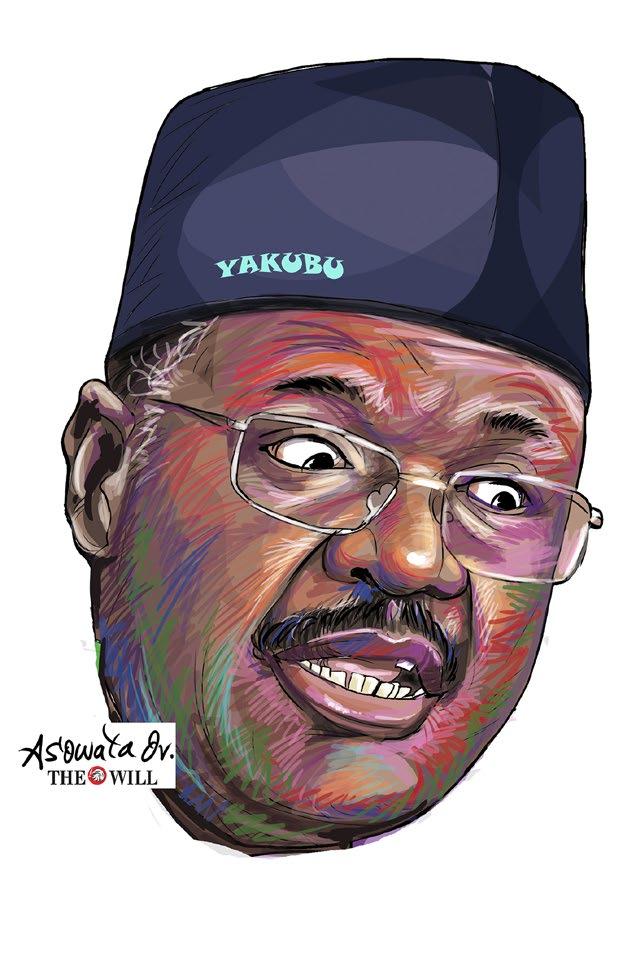
We have made arrangements for land and maritime transportation of personnel and materials. We have arranged for the delivery of sensitive materials for the election to arrive as early as Tuesday next week “
Adeleke made this appeal while in Ondo State to join Ajayi in the campaign tour to some local government areas, which was hosted by the Osun indigenes in Akure, the state capital.
Addressing the crowd, the governor said, “All the things they didn’t do in 12 years, we have done in two years in Osun. The election has come, go and tell them that we are behind your ‘governor’ (Ajayi). We have brought the light to Ondo State. If we trust in God, everything is possible. Agboola Ajayi has the experience up to the grassroots. He will repeat the wonders in Osun in Ondo. Let’s go back to our communities and tell our people that Agboola is the next governor of this state. I am glad

to be here to support my brother, Agboola Ajayi. All the systems are working in Osun and we want to replicate it in Ondo here. PDP is the only progressive party. Go and vote and stay with your votes.”
Responding, the Chairman of the Osun State indigenes in Ondo State, Mr Kehinde Ayinla, said they would be supporting Ajayi because he understands the challenges of the people and the state. He assured the PDP candidate of massive votes from Osun indigenes living across the 18 local government areas of the state.
Similarly, Governor Ododo has called on the people of Ebira community in the state to vote for the All Progressives Congress (APC) and its candidate, Governor Lucky Aiyedatiwa to sustain the laudable achievements of the APC government in the state.
Governor Ododo who is the deputy chairman of the election management and strategy committee of the Ondo State Governorship Election Campaign Council, made the call while addressing a crowd at the APC rally held at the Mobil Roundabout in Owo town over the weekend.
The governor described Ondo state as a second home for Ebiras and urged the Ebira community to repeat the feat exemplified in the 2020 Governorship election during which the APC recorded overwhelming victory in the state.
“I have come to thank you for the support you gave the APC in the last governorship election in Ondo state. I am aware that we have a large population of our people in Owo, Ifo and Ose local government areas, as well as other parts of Ondo state and I want you to take our message to all of them. Come November 16, 2024, I urge you to vote for the APC and Lucky Aiyedatiwa as the Governor of Ondo State” Governor Ododo stated.
He assured the people of Ondo State that the APC and its candidate Lucky Aiyedatiwa will deliver the desired dividends of democracy to the people of the state by improving physical infrastructure, access to education, healthcare, water and sanitation, agricultural development, and security of lives and property across communities in the state.
He described Governor Aiyedatiwa as a tested hand who can be trusted to build on the pedestal of growth and development already attained by Ondo state under the late Governor Oluwarotimi Akeredolu who died in December, 2023.
In his response, Governor Aiyedatiwa emphasized the importance of unity and peaceful co-existence among ethnic groups residing in Ondo state. He promised to create more opportunities for nonindigenous communities in the state if elected in the November 16 election.
Earlier, during a courtesy call by Governor Ododo on the Ohinoyi of Anebira in Owo, His Royal Highness, Adayi Isa Ahmed said he was excited to receive the Kogi State Governor in Owo, assuring that the Ebira community in Owo will vote for the APC candidate, Governor Lucky Aiyedatiwa in the governorship election.
He commended Governor Aiyedatiwa for appointing five members of the Ebira community into positions of authority in his administration and promised that the people will reciprocate the kind gesture by mobilizing more votes than what was achieved in the last governorship election in the state.
The APC rally in Owo was attended by members of the Ebira community from Utose, Omolonge, Utelu, Agopanu and others from the six local government areas.
On the verge of the 2019 General Election, then Chief Justice of Nigeria, Justice Walter Onnoghen was unceremoniously booted out of office by the Muhammadu Buhari Administration. The self-effacing CJN was charged with alleged false asset declaration, hurriedly arraigned before the Code of Conduct Tribunal, found ‘guilty’ and sent packing from office. His five bank accounts were ordered frozen by the tribunal.
code of conduct tribunal (Umar Danladi) to recuse himself from the proceedings because of the biased conduct he exhibited during the proceedings.”

From the judgement delivered by Justice Abba Mohammed, it was obvious that whatever evidence that was adduced against Justice Onnoghen and the manner of his trial were nowhere near legalism or jurisprudence. The Buhari administration ordered it and the tribunal obeyed its master’s voice
Last week, four years later, a threeman panel appointed by the Appeal Court, discharged and acquitted him of the charges and ordered that his frozen bank accounts and seized assets be restored to him.
From the judgement delivered by Justice Abba Mohammed, it was obvious that whatever evidence that was adduced against Justice Onnoghen and the manner of his trial were nowhere near legalism or jurisprudence. The Buhari administration ordered it and the tribunal obeyed its master’s voice.
According to Justice Mohammed, Justice Onnoghen, “before and during his trial, raised objections challenging the jurisdiction of the Code of Conduct Tribunal (CCT), to hear and determine the matter same having not been brought by due process of the law, as the appellant being a judicial officer, ought to have been reported to the National Judicial Council first; whose findings and recommendations would determine the action(s) to be taken against him.”
Secondly, “The appellant also filed an application asking the chairman of the
By the tribunal’s politicised judgement, the head of the Judicial arm of government, whose institution ought to work in mutual interdependence with the executive and legislative arms in a democracy, was unlawfully removed from office. The Justice institution rolled on as if nothing had happened to its head. The professional arm, the Nigerian Bar Association, NBA,’s voice was muted. The ‘see nothing, do nothing’ Attorney-General and Minister of Justice, Abubakar Malami kept mum throughout the mock trial. Except for trenchant voices of human rights lawyer, Femi Falana, a Senior Advocate of Nigeria, SAN, who urged Malami to stop the trial and late Constitutional lawyer, Ben Nwabueze, who called for the resignation of the president and Malami because of the trial, there was hardly a viable opposition on the matter. The opposition political parties themselves were tongue-tied.
For a regime that heralded its coming to power by conducting a series of raids and arrests of judges at the unholy hours of midnight, unchallenged, Justice Onnoghen’s kangaroo trial at the beginning of Election Petition Tribunal hearing in April 2019, two months after he was suspended from office on account of the alleged fraud, was not just a blot on Buhari ‘s disastrous government but also a day of reckoning for the judicial institution in Nigeria.
The partisan and sectional aims of the government and its goons were aptly captured in Nawbueze’s letter to the government: “ Buhari’s suspension of
the CJN, is in itself, a most condemnable subversion of the Constitution. But his statement, while announcing it to the public, makes the action so absurdly subversive.”
Now, in the course of his removal from office, Justice Onnoghen kept his cool, perhaps in expectation that the day of justice on the matter would finally come. The only time he reportedly commented on his travails was at a hometown reception where he joked about the hypocrisy of flaunting power as told in a tale of a lion and a fox, whereby the former conned the latter out of his belongings and dared him to say a word, to which the fox remarked, “I know where you were going.”
Having struck a deal with the current government to settle the matter out of court and then had the appeal court acquitted him of any charges, Justice Onnoghen’s decision to approach the courts as final arbiter in his own case shows a part of him that is in sharp contrast to the government’s aim. His belief in the rule of law and ultimate triumph of justice despite the obvious intimidation meted to him and the potential damage to both his reputation and career.
Such action clearly derived from his innermost intention that justice would be served no matter how long it took. This principled stand should serve as a lesson for our leaders in all spheres of life, particularly for office holders. It takes commitment, capacity and professional integrity to man an institution. That way, the institutions of society are strengthened by the personality and the long run impact is usually unquantifiable for the society at large.
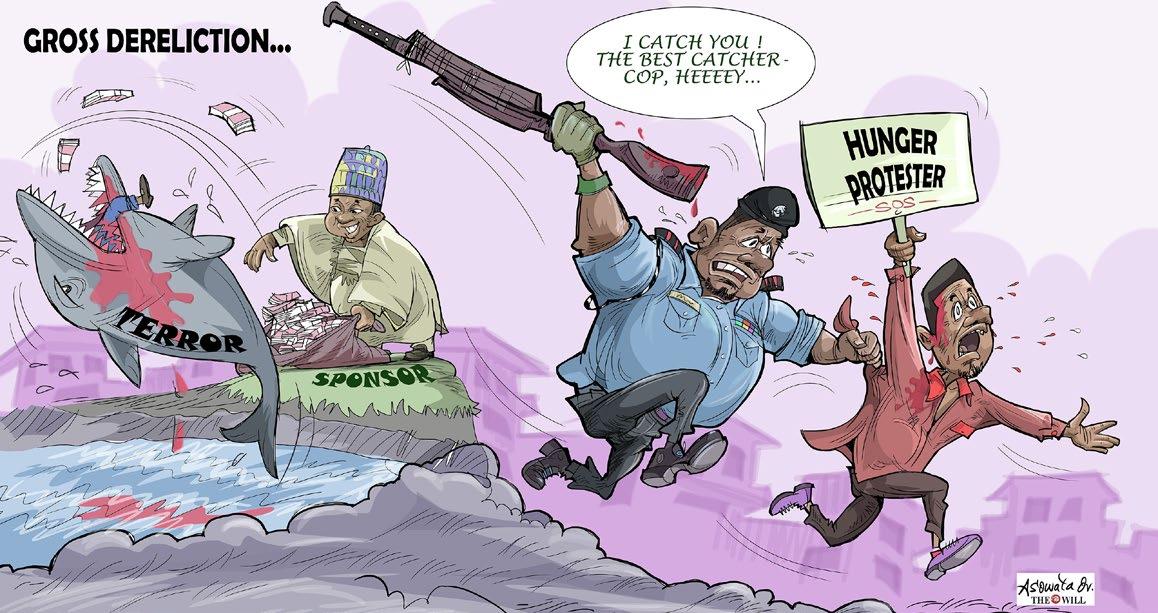


ADISA ATOLAGBE
State has been parading a grand delusion of contesting for the presidency in 2027. His so-called quest for the highest office is less of a strategic move and more
For anyone that is paying attention, Makindeís presidential ambition isnít just prematureóitís a shipwreck waiting to happen. As the saying goes,

MAKINDE’S CHANCES OF COMPETING WITH TINUBU’S WELL-OILED POLITICAL MACHINE ARE NEXT TO NONE. TINUBU’S STRANGLEHOLD ON THE REGION, BACKED BY A NETWORK OF LOYALISTS AND HIS IRON GRIP ON THE APC, WILL LEAVE MAKINDE LOOKING LIKE A POLITICAL LIGHTWEIGHT
Makindeís laughable leap into national politics reeks of overconfidence, raising an eyebrow about his ability to govern a country as chaotic and fragmented as Nigeria. Ambition isnít a bad thing, but when it is rooted in a foundation as shaky as Makindeís, it becomes absurd. His tenure as governor has been a disaster of missed opportunities and self-serving decisions that have more to do with his ego than the welfare of Oyo Stateís
Makindeís Achillesí heel is his abysmal track record in Oyo State. Despite the fanfare that accompanied his election in 2019, his administration quickly became a study in mediocrity. From
The man loves to flaunt high-profile projects, signing off on inflated road contracts and shady infrastructure deals funneled to his cronies. Critics argue that these so-called ìachievementsî are nothing more than financial black holes, designed to pad pockets rather than deliver any real value to the public. His governmentís debt has ballooned to unsustainable levels, leaving Oyo State on the hook for years to come. If this is the kind of ìleadershipî he plans to export to the national stage, Nigeria will Makindeís ambition is about as self-serving as it gets. His recent movesólike establishing the PDP
Southwest headquarters in Ibadanóreveal a politician more concerned with solidifying his grip on power than with actually improving the lives of the people that he supposedly serves. The governor is obsessed with positioning himself for national relevance, completely ignoring the needs of Oyo State as he chases his pipe dream of becoming president.
Makinde is busy grooming a puppet to succeed him in Government House and shield him from moves to investigate his actions in office, like they all do. Itís a ploy and Nigerians are sick of these kinds of cynical games. The electorate have grown tired of opportunistic politicians of his ilk who are more interested in self aggrandisement than serving the masses that elected him.
Makindeís political treachery is another nail in the coffin of his presidential bid. His betrayal of the Peoples Democratic Party (PDP), particularly during the 2023 General Election, is unforgivable.
Instead of backing the PDP presidential candidate, Atiku Abubakar, he and his G5 comrades threw their weight behind Bola Tinubu of the All Progressives Congress (APC). The backstabbing didnít go unnoticed and Makinde has since been cast as a disloyal opportunist within his own party.
This anti-party behaviour has left Makinde isolated and despised by the people he will need to win over, if he seriously thinks he has a shot at the presidency. His political credibility has been shattered and the idea that the PDP would ever trust him to represent them on the national stage is laughable.
To make matters worse, Makinde will be going up against Bola Tinubu, who, by 2027, will still be a dominating force in Nigerian politics. Makindeís chances of competing with Tinubuís well-oiled political machine are next to none. Tinubuís stranglehold on the region, backed by a network of loyalists and his iron grip on the APC, will leave Makinde looking like a political lightweight. Makindeís fractured alliances and inconsistent loyalty make it even less likely that he can cobble together the kind of regional support necessary to mount a credible national campaign. Taking on Tinubu in the Southwest, while trying to gather support from other regions, is not just an uphill battleóitís a foolís errand.
Seyi Makindeís presidential ambition is nothing more than a monumental miscalculation. His failure to effectively govern Oyo State, combined with his self-centred political antics and broken relationships within his party, makes him one of the least credible candidates for the presidency. Adding the insurmountable influence of Tinubu into the equation only underscores the futility of his bid. Nigeriaís political terrain requires leaders with competence, vision and a genuine commitment to public serviceóqualities Makinde sorely lacks. His presidential aspiration is nothing but a delusional fantasy, already dead before it ever had a chance to take off.
BY ADÉMÓLÁ ÒRÚNBON
Our nation is at a critical juncture where the impact of economic crises, global challenges, tumbling currency, insecurity and climate change is affecting the ability of many citizens to feed themselves. The figures are striking. As of March 2024, the food inflation rate increased by 40.01 percent, which is about 15.56 percent higher than the March 2023 rate. With the complexity and interdependence of the factors responsible for the current food crises, our approach to addressing them must go beyond the conventional means. We need a more agile approach to address the current food crises. An approach that can quickly adapt to our changing circumstances and effectively address the complex factors contributing to the crises. For this approach to be viable, it has to be rooted in three pivotal elements.
First, this approach must be holistic enough to consider the challenges in every phase of our food system and account for their current realities. This means that our approach must tackle the root causes of issues in our production, aggregation, processing, distribution, consumption and disposal, as well as ensure smooth, supportive, equitable coordination. Issues of insecurity, such as kidnapping and farmer-herder clashes, especially in rural communities, are some of the major factors that have caused many farmers to abandon their farms and led to reduced food production. This approach has to do everything to guarantee the safety of our farmers. The recent setting up of ìAgro Marshalsî tasked with the responsibility of safeguarding farmlands, schools and palaces in Ekiti State is a commendable step that should be embraced by other states. It must be emphasised that State or local government administrations will do a better job in this regard, as each community possesses peculiar local situations that can be best understood by its people.
In addition, federal or state administrations can complement these efforts by harnessing the opportunities in technological advancement and providing ìemergency alarms or phonesî for farmers. These devices can be used to alert local security outfits immediately in case of insecurity. In implementing this, the government must ensure proper coordination with different security outfits and equitable distribution.
The impact of climate change on our food production is becoming evident, with increasing cases of droughts, flooding and soil degradation in different parts of the country. It is time to face this reality and begin to prioritise climate change mitigation and adaptation measures. Many of the current agricultural institutes were established because of challenges facing the agricultural systems at some point in the past. Some of these challenges are now antiquated. It is time to update the mandates of agricultural institutes and institutions (or create new ones) to reflect todayís challenges.
The impact of fuel subsidy removal on the distribution and prices of food cannot be overstated.
Embracing an agile approach might mean setting up special channels for food transport across the country. Similar approaches have been carried out in some developed countries and tagged with names such as ìGreen Channel.î This might involve providing access to special buses and trains that can assist farmers in moving their food items in groups at subsidised costs.
Second, this approach must involve multidisciplinary collaboration in tackling the different challenges facing our food system.
Leaving the task of addressing our current food insecurity solely to the Ministry of Agriculture and Food Security is like trying to build a house with just bricks. While bricks are essential, a single material is not enough to complete the project. Similarly, addressing our current food insecurity challenges demands effective collaboration and input from almost all ministries, agencies and parastatals.
By utilising a stakeholder engagement model, each ministry can develop plans to support the Ministry of Agriculture. Furthermore, each state must develop a food system plan that details its mechanism for food production, distribution, export, interventions and regulation. This food system plan must include short-, medium- and long-term priority actions for a sustainable food system in each state. Private sectors, trade associations, civil society organisations and every stakeholder in the value chain also have roles to play in this collaboration.
THE IMPACT OF CLIMATE CHANGE ON OUR FOOD PRODUCTION IS BECOMING EVIDENT, WITH INCREASING CASES OF DROUGHTS, FLOODING AND SOIL DEGRADATION IN DIFFERENT PARTS OF THE COUNTRY. IT IS TIME TO FACE THIS REALITY AND BEGIN TO PRIORITISE CLIMATE CHANGE MITIGATION AND ADAPTATION MEASURES
Finally, for this approach to be effective and sustainable, it must be rooted in a commitment to the right of every Nigerian to adequate, healthy and affordable food, regardless of their socio-economic status. The right to adequate food is an agreement contained in many international instruments and even in the constitution of our country. Article 16 (2) of our 1999 constitution rightly states that ìThe State shall direct its policy towards ensuring: suitable and adequate shelter, suitable and adequate food, a reasonable national minimum living wage, old age care and pensions, and unemployment, sick benefits and welfare of the disabled are provided for all citizens.î
This provision does not mandate the government to knock on every door of its citizens and share food items (except, of course, in unfortunate situations of war). However, it requires that the government must do everything in its capacity to ensure its citizens have the enabling environment and support to produce, distribute and access food. It means that we must create a food system where profit does not take precedence over empathy and the right of fellow citizens to food. The ripple effect of hoarding and hiking food prices, if allowed to continue, will take its toll on everyone. Food is a necessity and right, and depriving people of this right is also depriving them of the right to live. Our state actors also have a significant role to play in protecting this right through consumer protection actions.
An agile-based approach to our current food insecurity can also be a means to reduce social inequalities in our communities. A common adage among our people says that ìif hunger is removed from poverty, then poverty becomes insignificant.î If policymakers continue to look at food insecurity from an agile-based perspective, we can solve many problems, including poverty and insecurity, with

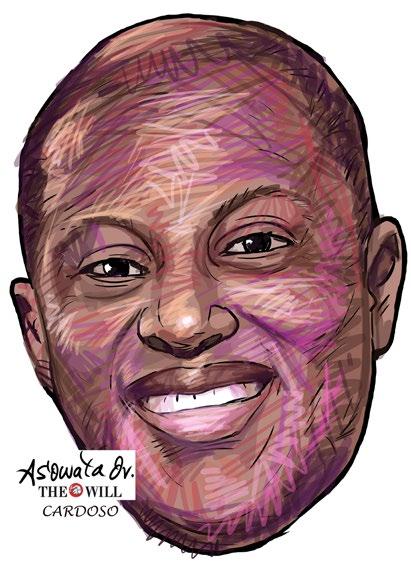
The Nigerian Foreign Exchange Market (NAFEM) saw a historic surge in activity on Friday, November 8, with a recordbreaking turnover of $1.403 billion, the highest single-day transaction volume, according to records.
This surpassed the previous high of $857 million recorded on March 28, underscoring a day of intensified trading and liquidity flow.
Friday’s trading closed with the naira exchanging at N1,678.87/$1, amid continued high demand for the dollar, contributing to the increased supply observed.
According to the daily forex report by the FMDQ – the forex market aggregator, the naira ended at N1,678/$1 on Friday, maintaining its all-time high close set a day earlier.
Friday saw an intra-day high of N1,698/$1 and a low of N1,609/$1, with the prior day reaching an intra-day peak of N1,700 and a low of N1,635/$1. Market turnover indicates the volume of foreign currency transactions within a trading day, and higher turnover generally suggests stronger liquidity as buyers and sellers engage more actively
The sustained high levels over two days reflect the ongoing strain in the forex market as the economy remained tethered with
Continues on page 15
EDITOR Sam Diala
UBA Seeks NGX Approval for Rights Issue of Over 6.8bn Shares / PAGE 15
BY SAM DIALA
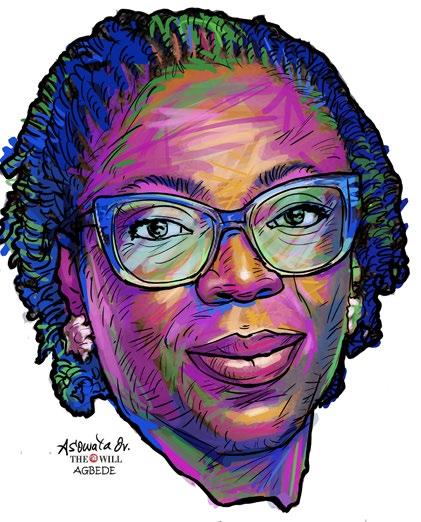
Access Holdings Plc, the parent company of Access Bank, Nigeria’s largest bank by assets, is inching towards a N50 trillion assets mark – the highest ever recorded by its industry peers.
According to its Q3 2024 interim report filed at the Nigerian Exchange (NGX) last week, the Group’s total assets surged to N41.1 trillion. This constitutes a 54.0per cent year-to-date rise as at September 30, compared to N26.6 trillion posted in the corresponding period of 2023.
Major components of the expanding balance sheet include Customer deposits which saw an impressive rise of 45.4 per cent, increasing from N15.3 trillion in December 2023 to ¦N22.3 trillion by Q3 2024, while gross loans and advances grew 56.2 per cent, reaching N13.9 trillion. This is coming nearly two years into its five-year Corporate Strategic Plan (2023-2027), as the Group has further raised the bar – consolidating on its prime status as Nigeria’s largest quoted company, by assets – moving remarkably to attaining a N50 trillion balance sheet by the end of 2024.
This reflects in its overall impressive performance in the ninemonth period incorporating Q3 as of September 30, 2024, as the Group recorded a 114.5 per cent, year-on-year increase in Gross Revenue to N3.4 trillion in Q3 from N1.6 trillion in the corresponding period of 2023.
Analysis of the report showed that the triple growth in topline was driven by Interest income, which constituted a 70 per cent of gross revenue at N2.4 trillion, while non-interest income contributed N1.0 trillion. This marks an 87.2 per cent increase due to higher transaction volumes on digital channels and other alternative platforms.
Notwithstanding inflationary pressures, the cost-to-income ratio


remained stable at 60.8 per cent, while profit before tax saw an 89.6 per cent rise to N558.2 billion, and profit after tax rose 82.8 per cent to N457.7 billion. This impressive performance translated to an annualised return on equity of 22.2 per cent, with earnings per share up to N12.40.
The Group’s impressive performance cut across its banking and non-banking subsidiaries, including Access ARM Pensions, Hydrogen Payments, and Access Insurance Brokers.
Subsidiaries in the UK and across Africa performed particularly well, delivering 54.8 per cent of the Banking Group’s profit before tax, an increase of 185.8 per cent year-on-year. The non-banking subsidiaries of Access Holdings also delivered consistent growth. Access ARM Pensions, following a merger with ARM Pensions, now oversees N3.1 trillion in assets under management.
Hydrogen Payments processed ¦N27.5 trillion in transactions, growing its operating profit by 516 per cent year-on-year to ¦ 5.7 billion. Access Insurance Brokers, still in its first year of operations, posted a gross written premium of ¦ 8.3 billion and a profit before tax of ¦ 641 million. New entrant, Oxygen X Finance, the group’s digital lending subsidiary, reported ¦ 2.1 billion in operating income and a profit before tax of ¦ 412 million.
At the lunch of the 5-year plan, Access Bank said it was set to move into the new strategic cycle with the following records: over 52 million customers which is more than the population of 85 percent (50) of African countries.
Superior service through four SBUs, across 17 countries
Continues on page 15
Continues from page 15
THE GROUP’S IMPRESSIVE PERFORMANCE CUT ACROSS ITS BANKING AND NONBANKING SUBSIDIARIES, INCLUDING ACCESS ARM PENSIONS, HYDROGEN PAYMENTS, AND ACCESS INSURANCE BROKERS
including, the UAE, UK, and 3 rep offices in China, India and Lebanon. There is 18.5 million unique mobile app and internet banking users, in addition to over 54,440 Point of Sale (PoS) terminals.
There is consistent financial performance as seen in the N906.9 billion gross earnings and N148.7 billion profit before tax as at nine months of 2022. Its professional staff stood at 6,000 and capital adequacy ratio (CAR) comfortably sitting at 22.6 percent.
“Our score sheet is robust and we are launching into the next strategic cycle with the greatest optimism that we will achieve and surpass our targets,” said Herbert Wigwe, then Group Managing Director/CEO.
Wigwe said, in launching into the continental space, the focus was to become a global player with African heritage while exploring the huge opportunities with the aid of technology.
“By 2027, we expect the Nigeria Bank to be contributing c.52 per cent of revenues compared to c.82 per cent (9M’22). The new verticals will also be contributing c.12 per cent of total revenues, as revenues from African Subsidiaries is expected to double over the next fie years”, he added.
The bank stated that, across Africa, there is an opportunity for Access to extend financial services to the unbanked and deepen its financial services offerings to banked customers.
This is targeted at about 370 million Africans who do not have access to financial services, with Nigeria accounting for up to 60 million. It noted that banked customers are demanding deepening of financial services including loans, payments, insurance.
Access Corporation identified addressable market pool through which international trade flows and growth opportunities in potentially untapped retail insurance markets. This is on the heels of Africa’s insurance penetration being generally lower than global average. It said AfCFTA will connect large swathes of the countries into a virtual trading zone.

Specifically, the Corporation says it sees opportunities in over $24 billion revenues for African electronic payments industry growing at 30 per cent yearly.
It also sees opportunities for over $3.6 billion in value of regulated consumer lending business in Nigeria, $950 billion total trade volume in sub-Saharan Africa, $100 billion in formal remittances and cross-border payments flows. Others are over 400 companies with annual revenues of $1 billion or more.
The Group said 150 companies that operate out of its subsidiary countries is a huge strength, adding that its footprint will grow significantly in the next strategic period.
“We will capitalise on our strong M&A capability and ability to build organically to create value with each expansion, prioritising countries with better sovereign rating and complementary business landscape,” the holco stated.
Africa’s Global Bank, United Bank for Africa (UBA) has announced the submission of an application to the Nigerian Exchange (NGX) for the approval and listing of a rights issue totalling 6,839,884,274 ordinary shares (six billion, eight hundred and thirty-nine million, eight hundred and eighty-four thousand, two hundred and seventy-four).
This announcement follows the bank’s Q3 2024 financial report, which showed a 101.88% year-on-year rise in pre-tax profit to N194 billion and a nine-month total of N603.4 billion, reflecting steady financial growth.
The rights issue, filed through UBA’s stockbroker, United Capital Securities Limited, proposes ordinary shares priced at N35.00 each, with a nominal value of 50 kobo per share.
Structured on the basis of one new share for every existing share held, the offering
is applicable to shareholders as of the qualification date, November 5, 2024.
This was confirmed in a statement signed by Godstime Iwenekhai, Head of the Issuer Regulation Department, noting that the application is now awaiting NGX’s review and approval.
UBA reported notable growth in Q3 2024, driven by improvements in revenue and profitability, with interest income accounting for 77% of gross earnings.
Despite a 19% decline in Q3, interest income from loans and advances to customers contributed 40.4% of total interest income for the quarter and 37% over the nine-month period.
In contrast, interest income from investments in securities rose, contributing 35% in Q3 and 42% cumulatively over the first nine months, driven by strong performance in the first half of the year.
the burden of importation amid low productivity underlying challenges of poor infrastructure, irregular power supply and inflation.
The parallel market rate closed even higher, reaching up to N1,730/$1 on Friday, October 8. This gap between the official and parallel market rates highlights the widening exchange rate disparity due to elevated demand pressures.
Market watchers attribute the $1.403 billion recorded on Friday representing a measure of total forex traded in the market, demonstrating a sharp increase in activity. As a response to mounting pressure, the CBN has been injecting forex into the official market to sustain liquidity levels.
This strategy is aimed at temporarily stabilizing the exchange rate, but known to be far from being sustainable.
Nigeria’s foreign reserves, which rose to $40 billion, provide a vital buffer for the CBN.
However, this reserve level may face challenges as demand continues.
In efforts to shore up dollar inflows, the government has announced plans to issue dollar-denominated bonds, which could supplement reserves and market liquidity in the coming months.
The least turnover in the 11TH month so far is $79.47 recorded on November 4, with the exchange rate closing at N1,676.90/$1.
BY TUNDE OMOLEHIN, SOKOTO
The Customs Zonal Coordinator for Zone B, Assistant Comptroller General of Customs (ACG) Sambo Dangaladima, has urged officers to uphold the goals and vision of the Comptroller General of Customs, Bashir Adeniyi, while discharging their duties.
Dangaladima gave the charge during a working visit to the Sokoto/Zamfara Area Command. During a session with the officers and personnel of the command, the Zonal Comptroller also advised them to embody the service’s motto of justice and honesty.
“The purpose of this meeting is to
foster a more effective and efficient system for trade facilitation.” Dangaladima said.
The report showed a 101.88% year-on-year rise in pre-tax profit to N194 billion, with a nine-month total of N603.4 billion, reflecting steady financial growth.
Analysts opined that UBA’s rights issue represents a step toward enhancing its capital position while positioning itself for potential future growth.
UBA’s stock performance in 2024 has reflected both market conditions and investor sentiment.
Starting the year at N25.65, the stock faced early declines before regaining a bullish trend. By September, UBA shares climbed to N28.30, and in October, the stock crossed N29, buoyed by increased trading activity.
The rally continued into November, with the share price closing at N31 on November 8, highlighting renewed investor interest in the bank’s stock.
In his remarks, the ACG briefed the stakeholders on the tireless efforts the service, under the leadership of Comptroller General Bashir Adewale Adeniyi, to ensure smooth trade facilitation in accordance with global best practices.
Some of the facilitation efforts highlighted by the ACG include the deployment of trade facilitation tools such as the Authorised Economic Operator (AEO) programme, Time Release Studies (TRS), and Advance Ruling (AR).
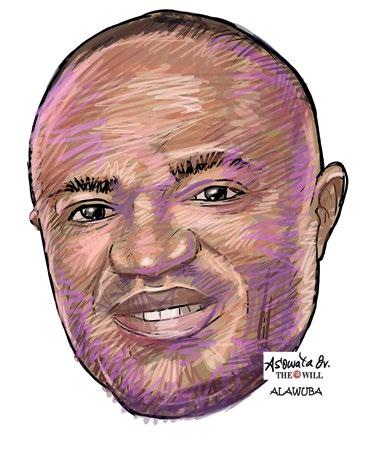


BY MARCEL OKEKE
Inthe healthcare field, ICU stands for Intensive Care Unit; a specialized department in a hospital providing close monitoring and life-sustaining treatment to critically ill patients. The ICU is usually characterized by advanced equipment, highly trained staff, close monitoring of the patients; and life-sustaining interventions such as mechanical ventilation, vasopressors, and renal replacement therapy, among others. The critical care in the ICU is usually to stabilize the patientís condition, prevent complications, and promote recovery.
Analogously, economically, Nigeria seems to have been taken into the World Bankís ICU in the past 16 months or so. More than ever before, it has gotten increasingly obvious that the country has been taking very ëbitter pillsí from the Bretton Woods institutions (The World Bank and the International Monetary Fund, IMF) to ëstabilizeí its ailing economy.
Nowadays, more than ever, the World Bank and its top officials keep pontificating and prescribing arcane procedures for the countryís economic recovery. Almost at the same time, as the global lender was releasing its ëNigeriaís Development Updateí (NDU) for October, 2024, the Bankís Chief Economist and Senior Vice-President Dr. Indermit Gill at the Nigerian Economic Summit Group (NESG) event in Abuja, was dishing out the ëdrugsí, dosage and timeline prescriptions for Nigeriaís sick economy.
While implicitly endorsing President Bola Ahmed Tinubuled governmentís economic reforms so far, the World Bank chief said: ìif these reforms are sustained for the next 10 to 15 years, Nigeria will transform its economy and become an engine of growth in sub-Saharan Africa. It is very difficult to implement such reforms, but the rewards are massive.î
Obviously, Dr. Gill was echoing the voice of the World Bank, which said in its October NDU that: ìmajor reforms have been undertaken to restore macroeconomic stability since May 2023. The government started to move towards marketbased pricing of gasoline to address the large fiscal cost of subsidized pricing. The CBN initiated major FX policy reforms that resulted in a unified, better regulated, and marketreflective official exchange rate.î
Noting that this policy direction was essential, the World Bank said in NDU that, ìbut in the short-term, it has added to already intense pressure on households and firms.î The global lender however concluded that ìThe indications that the macroeconomic situation is improving are encouraging, providing oxygen to the economy and the necessary condition for growth to ignite, with the help of additional, complementary measures.î
This prescription for ìadditional, complementary measuresî by the World Bank is however coming at a time when the economy has suffered more disruption than reforms. If after almost a year-and-half of application of World Bank-approved reforms in Nigeria, the citizenry has nothing other than impoverishment, pain and destitution to show for it, any additional reform measures will attract nothing but strident opprobrium and resistance.
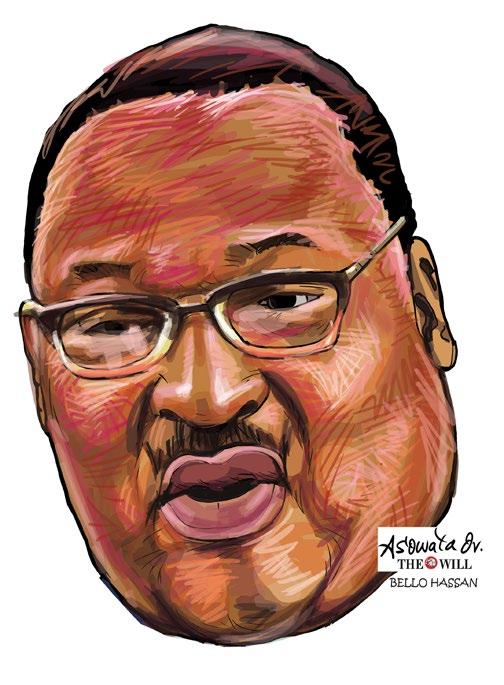
years ago, in June 1999, inflation rate was merely 6.62 per cent.
Claiming to be fighting this rampaging inflation, the Central Bank of Nigeria (CBN) has adopted the tightest monetary stance ever; raising the indicative Monetary Policy Rate (MPR) from only 18 per cent in May 2023 to 27.25 per cent in October 2024. And itching to raise it further. This has induced the highest lending rates in the deposit money banks (DMBs)óat between 34 to 35 per cent per annum.
The oil sector is being buffeted by a myriad of problems, including the bizarre phenomenon of oil theft, organized sabotage, dilapidated oil equipment, lack of new investments, etc
As a result of the series of reforms in Nigeria, practically all economic indicators are now at their worst state in the last two or three decades. Inflation rate shut up from about 22.5 per cent in May 2023 to over 34 per cent by June 2024; staying at 32.78 per cent as at end-September 2024. Ten years ago, in June 2014, inflation rate was only eight per cent; 25
This scenario has shut out most corporate borrowers from (access to) bank loans; but particularly, so many small and medium-scale enterprises (SMEs) have been asphyxiated. Shut out of bank loans or faced with very high cost of funds, businesses have been contending with unbearable operation costs.
Some manage to transfer such huge costs to the consumer, reflecting in rising prices of many products. Indeed, according to data from the Manufacturers Association of Nigeria (MAN), at least 767 manufacturers shut down operations and 335 became distressed in 2023. Unsold inventories amounted to N350 billion during the same period. Director-General of MAN, Segun Ajayi-Kadir has reportedly threatened that the associationís 2,500 members would shut operations ìto protest the 250 per cent hike in electricity tariffî after manufacturers were ìforcefullyî placed on the controversial ëBand Aíófor high tariff payment. Manufacturers have also complained about their inability to access foreign exchange (FX) to import raw materials and
machinery as well as high import tariffs calculated at parallel market rates by the Nigeria Customs Service (NCS). They are also contending with so many other taxes and levies imposed by various state and local governments across the country. However, the most disruptive of the reforms in the past 16 months has been the removal of fuel subsidyóa measure that shot the pump price of Premium Motor Spirit (PMS) from below N200 per liter in May 2023 to over N1,000 per liter at present. This singular policy, though broadly taken as desirable initially, has translated into very high transportation cost, ever rising prices of foodstuffs, surging house rents: all leading to runaway inflation.
Allied to the ravaging effect of the fuel subsidy removal has been the full flotation of the Nairaóan initiative that practically rendered the local currency ëworthlessí vis-‡vis the dollar and other hard currencies. While the Naira exchange rate to the dollar in May 2023 was N500/$, it shot up to almost N2,000/$ early this year, before hitting about N1,700/$, around which it now hovers.

This unprecedented collapse of the Naira in the FX market has caused major distortions in the economy. It made nonsense of business projections, budgets and plans of all corporate entities; including a jump in ëimported inflationí via inputs and machinery. Naira floatation which implied leaving to the vagaries of demand and supply interplay, the determination of the FX rates, led to the crash of the local currency.
Till date, the FX market is characterized by shortage of FX supply, in the face of ever surging demand for forex. For Nigeria, a largely import-dependent economy, the Naira floatation was a death knell of sorts. As a mono-product economyódepending almost entirely on crude oil exportóthe weakened Naira embedded in its floatation could not generate the expected spike in demand for Nigeriaís non-oil export. Unsurprisingly, rather than improving, crude oil production/ sales has been dropping or at best stagnating. Thus, while the year 2024 national budget is couched on assumed 1.78 million barrels per day (mbpd) oil production, actual production has remained at below 1.3 mbpd. The oil sector is being buffeted by a myriad of problems, including the bizarre phenomenon of oil theft, organized sabotage, dilapidated oil equipment, lack of new investments, etc. For a couple of years now, Nigeria has been supplying far below its OPEC-allocated quota.
However, apparently egged on by the World Bank and Co., the Nigerian Government has kept on with a series of reforms, especially the removal of subsidiesóreal or imagined. The removal of (perceived) subsidy in the electricity sector has led to over 200 to 300 per cent increase in the tariffóparticularly for so-called ëBand Aí consumers of electricity. But rather that experiencing any appreciable improvement in power (electricity) supply, the national grid has kept collapsingó leading to the country being thrown into total darkness for days every week.
In the face of all these, the World Bank insists that ìthe monetary policy stance needs to remain tighter until a sustained disinflation path is achieved, along with continued improvements in policy transmission.î Same goes for the Bankís blanket approval and support for all other reforms that have been sporadically eliciting public protests in so many locations across the country.
Palliatives or no palliatives, millions of Nigerians are being pushed down the poverty line by the persistent runaway inflationary trend, and its concomitant rising cost of living. Indeed, the World Bankís NDU reports that ìover 129 million Nigerians who now live below the national poverty line represented a sharp rise from 40% in 2018 to 56 per cent in 2024.î
Yet, as Indermit Gill, the World Bank chief said in Abuja, Nigeriaís ìreforms need to be sustained for the next 10 to 15 years,î by which time 100 per cent of Nigerians would have become poor! After all, Nigeria is already in their ICU, and really in critical condition.
ï Okeke is a practising Economist, Business Strategist, Sustainability expert and ex-Chief Economist of Zenith Bank Plc.












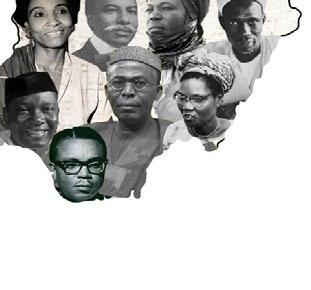








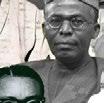






Half Page N1, 300, 000
Double Spread N1, 550, 000

Double Spread Half Page N1, 200, 000
10X6 N700, 000
10X5 N650, 000
10X4 N600, 000
10X3 N500, 000
9X6 N440, 000
9X5 N395, 000


9X4 N335, 000
9X3 N310, 000
8X6 N410, 000
8X5 N380, 000




7X5 N320, 000
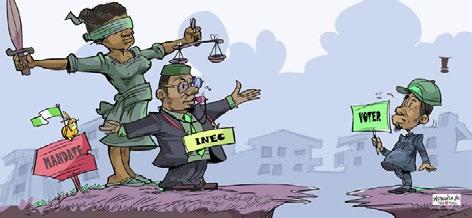


7X4 N315, 000
6X5 N280, 000

6X3 N145, 000
6X2 N85, 000
5X2 N70, 000
4X4 N160, 000
4X3 N95, 000
4X2 N65, 000
3X3 N60, 000
3X2 N50, 000
2X2 N30, 000
2X1 N15, 000 1X1 N7, 000
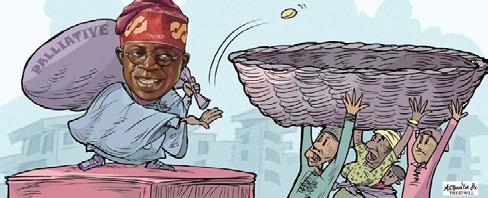












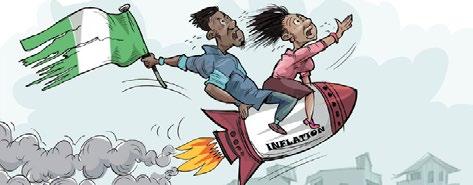






















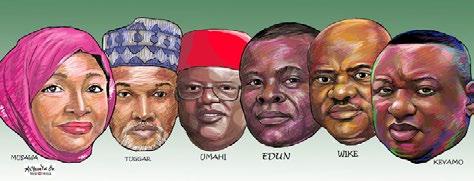


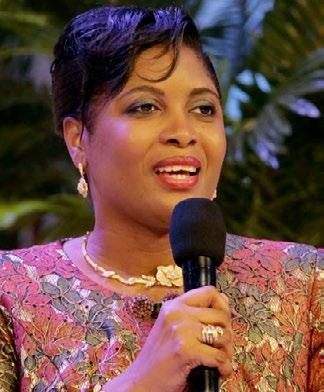
Chairman of the Board of Directors at Parallex Bank, Dr Adeola Adejoke Phillips, has been honoured with the distinguished title of Honorary Senior Member by the Chartered Institute of Bankers of Nigeria (CIBN) at its 2024 Fellowship Investiture. The 2024 Fellowship Investiture celebrates the excellence and leadership that define Nigeria’s banking industry, honouring
Continues on page 20
DOUBLE HONOURS FOR HAFSAT BALEWA
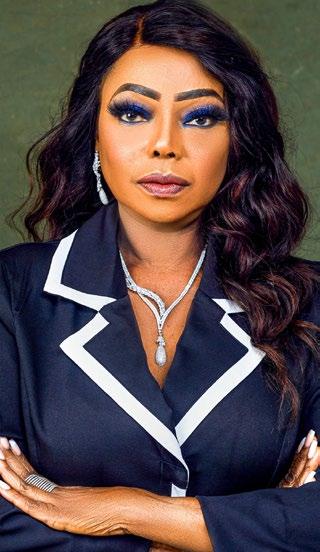
It was an evening of double honours for Dr Hafsat Balewa, the Chairman OgunGuangdong Free Trade Zone when she was recently awarded an Honorary Doctorate in Business Management and Humanitarian Studies by the American Management University. Hajia Balewa also won the ‘Entrepreneur Of The Year (Female) Award
Continues on page 20
EDITOR
Ivory Ukonu



For many television viewers, the face of Funke Kate Adepegba brings back memories of ‘The Village Headmaster,’ a popular television soap opera that ruled the airwaves in the 1980s and ’90s. The way she played her role as one of the dutiful girls in Sisi Clara’s shop opened the doors to other acting gigs for her. She speaks with IVORY UKONU about her acting career and sundry issues.
Excerpts:
When did you realize you were popular as an actor?
Of course, it was in the very first one, ‘The Village Headmaster.’ That was over 41 years ago.
How did you audition for the TV drama series? That wasn’t the intention initially. I had just lost my dad at the time. So, I needed a job. I was very young. I had this neighbour that worked with the Nigerian Television Authority, NTA. She said I could come see her for a job. I went there, but she was not in her office. So, I decided to stroll around for a bit and then go back inside. I strolled around the studio, I think it was Studio A at that time and, incidentally, ‘The Village Headmaster’ was being recorded. I knew the late Funso Adeolu who later became a king. He was my neighbour at that time. He was in the studio. When I walked in, he thought it was him I came to see, but, of course, I was just strolling around the place. The star at that time, the late Dejumo Lewis, saw me and he Adepegba asked Oba Adeolu, “Uncle, we are looking for a small girl. Can this your daughter play the role?”
I remember Uncle Funsho said, “No, no, that’s not why she came.” Dejumo insisted that I read a script and I just read it in passing. I didn’t even take it seriously. I had never done an audition in my life. I didn’t take it seriously. I finished reading and he said, “Okay, you can’t go home now, you have to shoot.”
I said, “Ah, they will be looking for me at home.”
That was how I did my first shoot in “The Village Headmaster.”
Weren’t your parents against you taking up acting at that time and in the way you did?
No. In actual fact, they gave me their support and all the encouragement I needed.

When growing up, did you have a premonition that you would take to acting as a career?
I tell people that I owe my emergence as an actor to my early school days, that is, my primary and secondary school, where I did a lot of acting and was exposed to a lot of literary textbooks. I actually started as a child actor, but then I still didn’t want to be an actor. I wanted to be a diplomat or a linguist, and I looked forward to working in an organisation like the United Nations. But God has the final say in our lives.


There was talk about revamping the drama series. What happened?
We are no longer doing it. It came up briefly in 2020 and 2021. We had the first and second seasons, but I don’t know, for whatever reason, the drama series couldn’t go on.
You have done some stellar acting in other movies and TV series after ‘The Village Headmaster.’ What has that been like?
It has been good. I worked with the late Amaka Igwe for a while, where we did ‘Checkmate’. My role was Celestina. I was Nobert Young’s second wife in the soap opera. After that, we did another one that was produced by Ego Boyo. Then there was ‘Mirror In the Sun’ where we had Richard Mofe Damijo, Joke Silva, etc. Then I did ‘Fuji House of Commotion, which was a spin-off of ‘Checkmate.’ It was part of ‘Checkmate’ at that time because there were four families in ‘Checkmate’. ‘Fuji House of Commotion’ was by Amaka Igwe. How do you cope with stardom?
I’m not a starstruck human being. Naturally, yes, I do go to the market, if there is the need to do so, even though I have not been to the market in a long time. But, if I need to go into the market, I will go. We are first human beings before becoming star actors and the way we perceive ourselves is different from how others do. For me, nothing has really

changed. I still do whatever I need to do. Maybe not buying ‘boli’ and groundnut by the roadside, probably because I am not used to doing that. If I was doing that before, I probably would still do it. If I need to do any other thing publicly, like going to the market, that is not an issue at all.
You have been acting for over 40 years. You are 61 yearsold, but you do not look anything like it. What is the secret? It’s just the glory and the grace of God. As you lay your bed, so you will lie on it. Basically, for me, I just take life easy and live healthy; there’s no hard and fast rule about it. I don’t overdo things. I just take everything easy.
What are some of the lessons you have learnt about life? Life is for the living. No matter what happens and what you do, try to stay alive. Do not hold grudges. Do not take life too seriously. Do not take yourself too seriously. Take each day as it comes and leave the rest to God. Don’t be desperate. In fact, these days, in the 21st century, what we have is more models than actors. People just want to show their face on television rather than put in the work. For me, I would tell them, don’t be desperate, whether acting or in anything, do not be desperate. And try to get some training. When you are trained in whatever you want to do, it makes you a better person. Then just take one day at a time.
STORIES BY IVORY UKONU
Six months after he hosted some members of the northern elite to the wedding of his daughter, Nafisa to her lover, Muhammad Bashir Mangal who happens to be her uncle, billionaire businessman, Dahiru Mangal, Founder and Chairman of Max Airline again, last week, threw a grand wedding party for his second daughter, Zainab. Zainab married her heartthrob, Alhaji Atiku Ibrahim in a wedding that spanned three days. The couple had their wedding Fatiha on
Saturday November 2 in Kofar Kwaya, Katsina State and it had notable personalities such as former senate presidents, Bukola Saraki and Ahmad Ali in attendance. The wedding activities commenced on Wednesday October 30, with a henna party. This was followed by a Kamu party for the bride on Thursday, October 31 and the Nikkah that was held on Saturday November 2. All the three events took place in Kastina. The grand finale will take place in the coming week in Abuja.

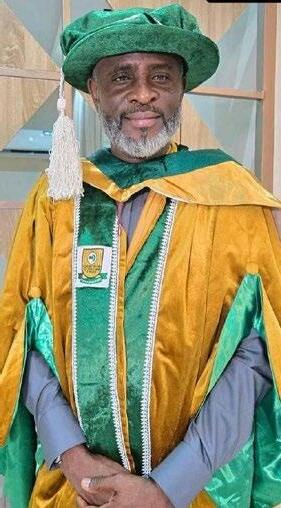
Abdulkabir Jibola Gbemisola has been honoured with an honorary doctorate degree from Crescent University, Ogun State. He was honoured for his wise business acumen in successfully running and repositioning Fatgbems Group of Company to accomplish some feats lately.
Continued from page 18
Pastor David Ibiyeomie, the founder and head pastor of Port Harcourt, Rivers State-based Salvation Ministries is following the footsteps of his spiritual father, Bishop David Oyedepo, founder of Living Faith Church Worldwide aka Winners Chapel.
Apart from commanding humongous resources for the promotion of God’s kingdom like Bishop Oyedepo, Ibiyeomie who like his spiritual father is synonymous with building gigantic structures, including the ongoing 105-seater Ark project, is currently building a 120,000-seater church auditorium in Rivers State, aptly named the ‘Hand of God.’ It is so named because the architectural design depicts a human palm. On completion, the building which began in 2010 will become the world’s largest church building.
Not done with emulating Bishop Oyedepo, Salvation Ministries recently announced during his 62nd birthday celebrations last month that it has acquired 200 hectares of land for the building of the church owned university, again following in the footsteps of his spiritual father who is the chancellor of Covenant University which continues to top the list of best universities in Nigeria and Landmark
University which has experienced a rapid rise in reputation since it began operation.
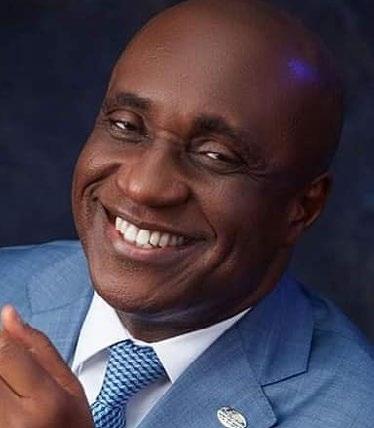


Abdulkabir is the first son of late Alhaji Abdulfatai Gbemisola, the founder of Fatgbems which he set up in 1986 in Ogun State. At that time, the company was just a trading business specialising in automobile components such as tyres, lubricants and vehicle spare parts. The company was a major distributor for the United Kingdom made Michelin and Trendsetters tyres. But through sheer dint of hard work, commitment and dedication learnt at his father’s feet, Abdulkabir has taken the company to greater heights after his father’s passing in 2012. Although the late Alhaji Gbemisola left behind four sons, they all run the company in their various capacities under the direction of Abdulkabir who is the Chairman and Group CEO. The 46-year-old led the company to rebrand in 2017 and expanded, diversified it into formidable entities in the different sectors of the economy. The conglomerate now has interests in petroleum marketing, haulage, trading, manufacturing, agriculture and real estate, making the company a top player in the Nigerian business space. The Group is behind Torque tyres Nigeria.
Fatgbems Petroleum Ltd started out with one service station in Ejigbo, Lagos in 2006, but today, it has grown to over a hundred service stations across the country. Fatgbems Petroleum Ltd operates one of Nigeria’s largest petroleum storage facilities, a 30 million litre storage tank farm located in Lagos. The facility has a state-of-the-art gantry capable of dispensing and trucking 3 million litres of petroleum products daily. The company has a truck holding bay that warehouses 100 trucks per time.

individuals like Dr. Phillips who embodies the institute’s values of integrity, progress, and unwavering commitment to the sector. The event, which took place at Harbour Point Event Centre in Victoria Island, Lagos, brought together esteemed leaders, dignitaries, and professionals across the banking and financial sectors to recognise and celebrate contributionsexemplary to the industry. The investiture ceremony was chaired by Dr Stella Chinyelu Okoli, OON, Founder of Emzor Pharmaceutical Industries, who made her first public appearance since her 80th birthday where singer, Onyeka Onwenu who had earlier performed from her

repertoire of songs, slumped and later died.
The event highlighted the accomplishments of Dr. Phillips and other honorees who have shown exceptional dedication to advancing Nigeria’s banking and financial sectors.
A graduate of the University of Lagos with an MBBS, Dr. Phillips has been able to garner a wealth of experience and strategic expertise, including C-level management in operational planning, branding, innovation, and crisis management. Known for her commitment to diversity and mentorship, she continues to be a guiding force in shaping the future of banking leadership.
STORIES BY IVORY UKONU
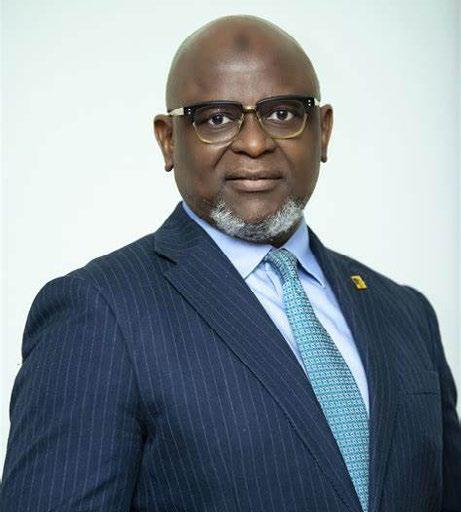
It was celebration galore as the staff and management of First Bank of Nigeria Limited, last weekend, feted dignitaries to a special sendforth party for Dr Adesola Adeduntan, the immediate past group chief executive officer of the bank.
conspired and almost truncated the length of time Adeduntan was to spend at the bank. In 2021, the board of the bank headed by Awosika and Otudeko sacked him from his position as MD/ CEO, eight full months to the expiration of his third term of three years and named his deputy as his replacement. The ill-fated plan was hatched just after Adeduntan was appointed director of the bank’s holding company; a position reserved for the Managing Director of the banking subsidiary. Trouble started when the CBN raised concerns over the bank’s failure to comply with regulatory directives on divesting its interest in Honeywell Flour Mills, owned by Otudeko. The concerns were finally addressed to Awosika in a letter after several reminders which were ignored.
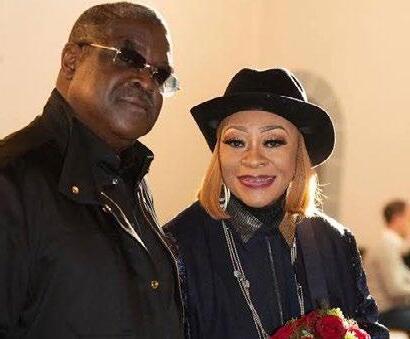

PThe ceremony which took place at Harbour Point event centre in Lagos, was in celebration of Adeduntan’s remarkable leadership and legacy. Quite a number of eminent personalities across all sectors of the economy were on hand to honour him. From fellow bankers to politicians to businessmen and women to traditional rulers and even ex members of staff - they all converged to honour Adeduntan whose exit from the first-tier bank, speaker after speaker said, marks a remarkable chapter in the annals of Nigeria’s banking history, including how he brought the bank which was in crisis at the time he took over, from the brink, back to a position of stability.
Interestingly, two former highly placed personalities in the bank, Obafoluke Otudeko, a former chairman of FBN Holdings and Ibukun Awosika, a former chairman of First Bank of Nigeria Limited and the first woman to be so, were conspicuously absent at the ceremony. And the reasons are not farfetched. The duo in tandem,
Herbert Wigwe, the late Group CEO of Access Holdings PLC has been honoured by the organisers of the Africa International Film Festival (AFRIFF). Wigwe, who was a huge financial supporter of the film festival curated by Chioma Ude, was honoured with the introduction of an award category - the ‘Trailblazer Award’ category. The category was launched at the festival’s opening night last week in Lagos. The new award category aims to recognize Nigerians excelling in creative fields while also commemorating Herbert’s legacy and contribution to the creative industry. The first recipients of the award were Benedict Oramah, President of Afreximbank and Babajide Sanwo-Olu, Governor of Lagos State. Also, Nigerian-British actor, John Boyega was presented with the Trailblazer Award for his outstanding achievements in the film industry. Wigwe died on February 9, 2024, in a helicopter crash in the United States of America alongside

The apex bank was worried about why the bank was yet to perfect its lien on the shares of Otudeko in FBN Holdings which collateralised the restructured credit facilities for Honeywell Flour Mills contrary to the conditions precedent for the restructuring of the company’s credit facility. CBN had in the letter, instructed the bank to diversify the equity investments in all non-permissible entities such as Honeywell Flour Mills and Bharti Airtel Nigeria Limited within 90 days.
The letter from CBN did not go down well with Otudeko leading to the decision to remove Adeduntan who he (Otudeko) saw as being planted in the bank by CBN to checkmate him. The CBN believed he (Otudeko) and other directors were the major reason for the spate of bad loans in the bank over the years. Barely 24 hours later, Adeduntan was reinstated by the Central Bank of Nigeria, CBN and immediately sacked the entire board of the bank and that of the holding company. According to it, it did so in order to protect the 31 million customers and minority shareholders of the financial institution. It cited insider abuse, insider credit and breakdown of corporate governance as the reason for sacking the boards. Since his sack, Otudeko has been clamouring to return as the chairman of the holding company with the surreptitious acquisition of shares. Unfortunately, his plans have yet to materialize.
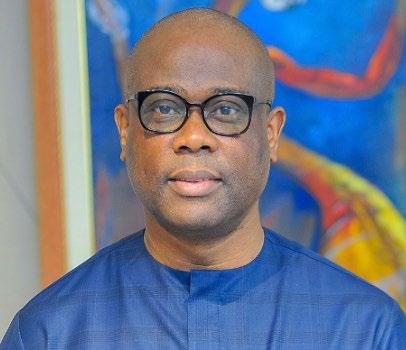
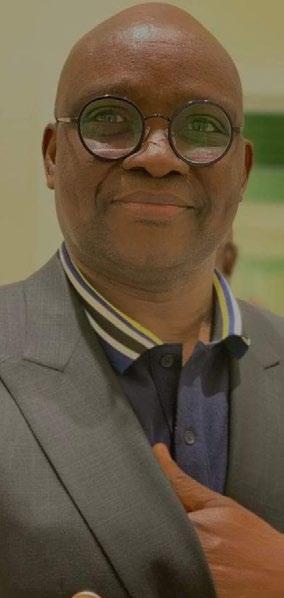
Penultimate week, the duo of Isaac Fayose and his sibling, Otunba Emmanuel Fayose, led some of their other siblings to host dignitaries to the 85th birthday party of their mother, Dr (Mrs) Victoria Olufunke Fayose. The party was held at an exclusive event centre in Ikeja, Lagos. Dignitaries led by the Ooni of Ife, Oba Adeyeye Enitan Ogunwusi (Ọjájá II) honoured the Fayoses with their presence. However, former Ekiti State governor, Ayodele Fayose was conspicuously absent at the party because the former governor and his younger brother, Isaac have been at war over the incumbent governor, Biodun Oyebanji. Isaac has been making displeasing remarks about his older brother who he says has been supportive of Oyebanji despite knowing that Oyebanji has been allegedly performing below average since he became governor. Isaac criticised his brother for sucking up to Oyebanji and scoring his government high when in reality the governor has not performed up to expectations. Isaac recently called for street protests over issues relating to alleged poor condition of roads and failure of the education system. Shortly after their mother’s party, Isaac took to social media to issue a strong warning saying, “Please hold Ekiti government and former governor Ayodele Fayose responsible for anything that happens tomorrow in Ekiti. I hope you are all aware that he has blocked our mother for over six months and refused to attend her 85th birthday all because of politics and power.”
The feud between the two siblings has polarised the Fayose family with some members taking sides.
astor Idowu Iluyomade the erstwhile Senior Pastor at the Redeemed Christian Church of God (RCCG), City of David Parish and his wife Siju, who have both been off the social radar for months now for obvious reasons, are back in the public eye. Both of them have now decided to add gospel singing to their resume with the release of their joint new single, ‘No One Can Thank You Enough.’ The single was released last Sunday across all streaming platforms. Prior to its release, Pastor Iluyomade had begun a one-week countdown awareness on social media and had kept many anxious about what he was up to. Some had even envisaged that he was on the verge of launching a new church project. But surprisingly, it turned out to be a new gospel single featuring his wife. Pastor Iluyomade claimed that he got the inspiration for the song from heaven while asleep.
“Through the years, I have had many unsolicited Heavenly Invasions that come in through various visions and the audible voice of God to lead, direct, and sometimes warn of intending dangers. All the Heavenly noggins have come to pass.
My latest of these unsolicited
heavenly invasions happened over time. As I sleep, I suddenly find myself amid the Heavenly Angelic Choir singing loud praises and worship with tunes, lyrics and melody to the King of Kings and Lord of Lords,” he said.
“Eventually, I captured five songs with their tune, lyrics, and melody. For a while, I was singing them until it dawned on me that God must have given me these unusual encounters for a purpose and not for my consumption, but for the global exaltation of His name and the dissemination of his awesome greatness through music SUNG REAL TIME by the Angels whilst worshipping God in Heaven. I have now decided to begin to record these songs starting with ENOUGH featuring my Sweetheart,” he added. Pastor Iluyomade was initially suspended for three months in June by the hierarchy of the RCCG over allegations of misconduct. He was later redeployed to the church’s headquarters. Himself and his wife have kept low profiles since then and only made an appearance during the 80th birthday celebration of Nike Akande, a former Minister of Industry.

Wealthy philanthropist, Sir Kessington Adebutu, who recently celebrated his 89th birthday penultimate week, has donated a multimillion-naira Media Resource Centre to the Nigerian Institute of Journalism (NIJ), Lagos. The self-named media resource centre was donated to NIJ to enhance the training of budding journalists in Nigeria and it came with a 350-capacity hall. Both Olusegun Osoba, a former governor of Ogun State and the Chairman of the Governing Council of
NIJ, alongside Gbenga Adefaye, the Provost of NIJ, praised Kessington for his contributions to the growth of journalism in Nigeria. They appreciated the gesture from Sir Kessington, describing it as an opportunity to nurture future journalists with relevant skills.
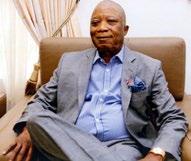
Photo Editor: Peace Udugba [08033050729]

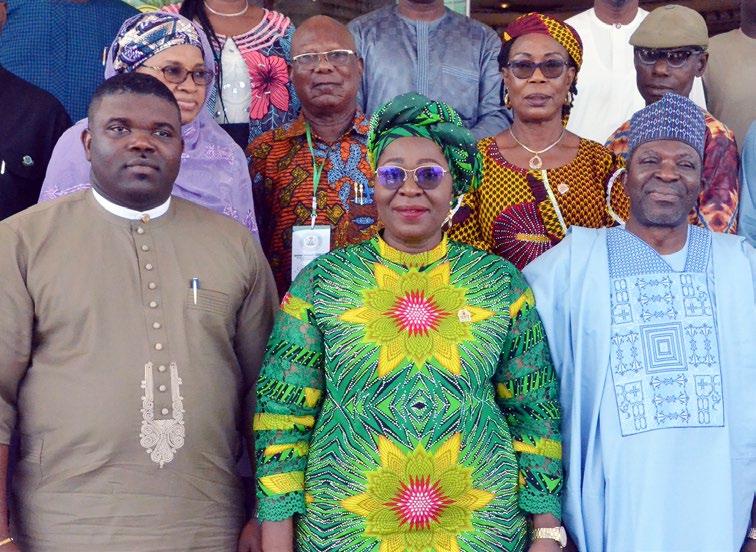
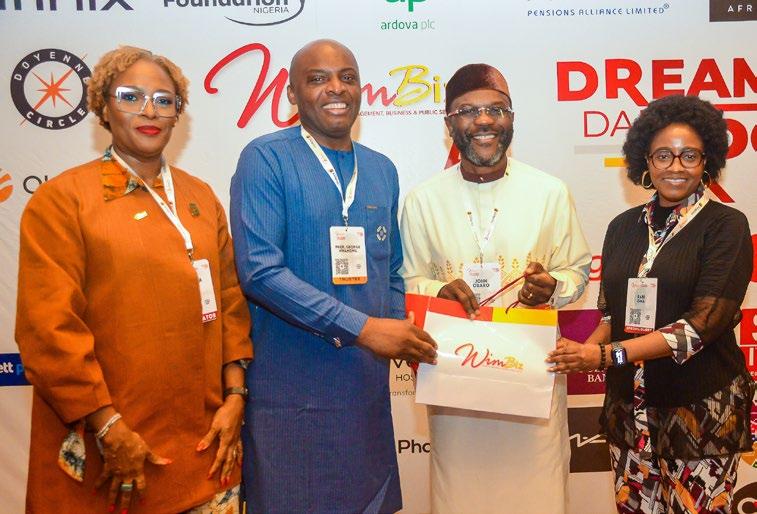
L-R: Director, External Affairs and Social Performance, Seplat Energy Plc, Chioma Afe, Member, Board of Trustees, Women in Management, Business, and Public Service (WIMBIZ), Prof. George Nwangwu; Managing Director, SystemSpecs Holdings Limited, Dr. John Obaro, Group and Chairperson, Board of Directors, ActionAid Nigeria, Rabi Isma, at the WIMBIZ 23rd Annual Conference held in Lagos on November 7, 2024.
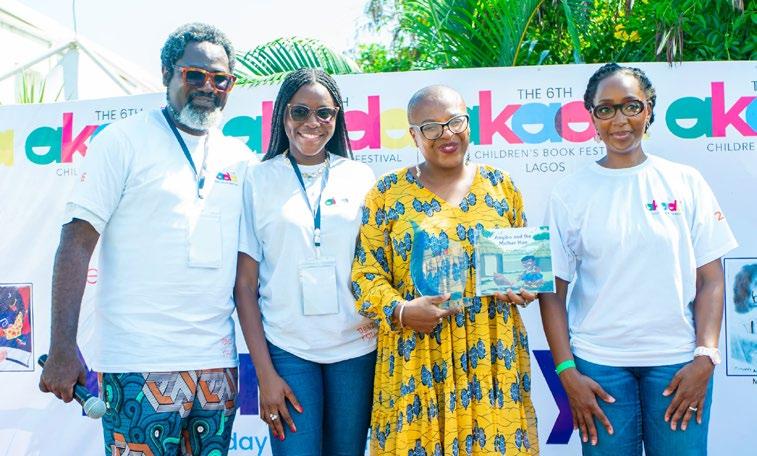

Corporation
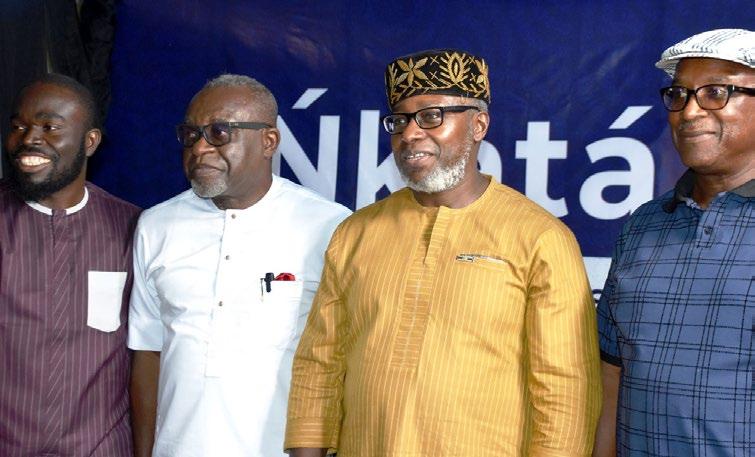



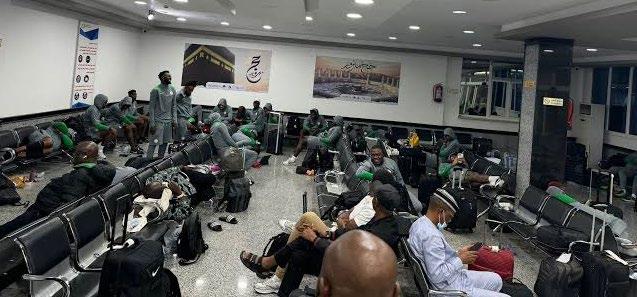
BY JUDE OBAFEMI
The recent dispute between Nigeria and Libya over a postponed Africa Cup of Nations (AFCON) qualifier has spiralled into a broader diplomatic crisis, with Nigerians in Libya facing a wave of hostility and discrimination. The conflict began when the Confederation of African Football (CAF) fined the Libyan Football Federation $50,000 for mishandling the arrival of Nigeriaís national team, the Super Eagles, in Benghazi. Libyaís authorities were found to have disrupted the teamís preparations by changing the designated match venue at the last minute, leading to the postponement of the crucial qualifier. The CAF ruling, which awarded Nigeria a 3-0 victory, has provoked outrage in Libya, where many view the decision as unfairly favouring Nigeria and undermining the countryís sovereignty.
This sports-related dispute has now escalated into a dangerous situation for the Nigerian diaspora in Libya. Reports indicate that Libyan media outlets and public figures have been calling for retaliatory measures against Nigerian nationals, including mass arrests, fines, and even deportations. Eyewitness accounts and leaders of the Nigerian community in Libya have confirmed that these threats are being carried out, with Nigerians being detained indiscriminately regardless of their legal status. The Nigerian government has voiced its disapproval of these actions and has engaged in diplomatic efforts to protect its citizens. However, the response has been cautious, as any further escalation could complicate relations between the two countries and worsen the plight of Nigerians living in Libya.
The tensions between Nigeria and Libya can be traced back
to the Nigerian football teamís arrival difficulties in Benghazi. According to reports, the Super Eagles were diverted from their designated airport in Benghazi to a different location, significantly disrupting their preparations for the match. This incident, which the CAF ruling deemed a breach of its regulations, has been perceived by many in Libya as an attempt by Nigeria to undermine the countryís sporting prowess. The Libyan Football Federation (LFF) has described the CAF decision as ìunjust and malicious,î alleging that Nigeriaís influence within the continental governing body played a role in the outcome. This sentiment has fueled public frustration, with Libyan media outlets and social media commentators portraying the ruling as an attack on the nationís autonomy.
The backlash has manifested in the form of anti-Nigerian rhetoric and calls for retaliatory actions. Libyan news outlets and social media pages have published editorials and posts urging the government to crack down on Nigerian expatriates, with some going so far as to demand the arrest and deportation of Nigerians residing in the country. These developments have placed the Nigerian diaspora in Libya in a precarious situation.
Numerous reports indicate that Libyan authorities have indeed begun targeting Nigerians, conducting mass arrests, imposing fines, and threatening deportation ñ often without clear legal justification. Community leaders and individual Nigerians in Libya have spoken out, expressing concerns about their personal safety and the absence of effective diplomatic intervention.


The Nigerian government must continue to advocate for the rights of its citizens in Libya

The implications of this crisis extend beyond the immediate welfare of Nigerians in Libya. The situation highlights the vulnerability of Nigerian citizens abroad, particularly in countries where social and legal protections for expatriates are limited. The stakes are high for Nigerians living and working in Libya, as any large-scale deportations or detentions could have significant socioeconomic impacts back home. Moreover, Libyaís actions risk further isolating the country from its African neighbours. Libya has been working to restore diplomatic relations within the continent, aiming to build partnerships for economic recovery and regional security cooperation. However, its treatment of Nigerians could jeopardise this trajectory, as Nigeria may seek support from fellow African Union (AU) member states, potentially leading to potential sanctions or reductions in trade and aid partnerships for Libya.
While the crisis continues to escalate, there is an urgent need for both Nigeria and Libya to engage in a mediated dialogue to prevent further deterioration. Regional organisations, such as the African Union (AU) and the Economic Community of West African States (ECOWAS), could play a
crucial role in facilitating such discussions, helping the two nations reach a mutual understanding and address the underlying grievances.

African leaders have a responsibility to demonstrate unity and respect for the rights of citizens across borders. Disputes arising from sports events should remain within the sporting domain, without spilling over into broader intergovernmental or intersocietal conflicts. The current crisis is a stark reminder of how quickly disagreements in one sphere can infiltrate others if not properly managed.
By prioritising dialogue and deescalation, African nations can protect the rights and safety of all African citizens living abroad.
The diplomatic community, including entities like the African Union and United Nations, has an important role to play in this process, ensuring that both Nigeria and Libya remember their shared responsibility to uphold the well-being of their citizens, regardless of nationality.

The Nigerian government must continue to advocate for the rights of its citizens in Libya, engaging in robust diplomatic efforts to secure their safety and prevent further retaliatory actions. At the same time, Libya should reconsider its policies that unfairly target expatriate communities as a means of expressing national dissatisfaction with international rulings. It is essential that both countries work towards a resolution rooted in mutual respect and regional solidarity. A swift and measured response is necessary to prevent further violence and ensure the safety of Nigerians in Libya. African nations must resist the temptation of retaliation as a form of protest, remembering that innocent civilians should never pay the price for political disputes.
The ongoing crisis between Nigeria and Libya is a test of Africaís diplomatic maturity and its commitment to regional unity. The escalation of a sports-related dispute into a broader
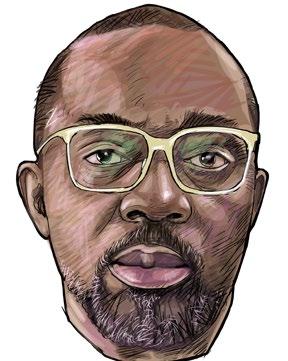

ogannah@thewillnews.com
The recent 2024 American presidential election, which saw the return of Donald Trump to the White House as the 47th President, offers valuable insights into the dynamics that can shape electoral outcomes in countries with similar democratic challenges, such as Nigeria. Three critical factors contributed to Trump’s victory: economic dissatisfaction with the incumbent administration, the strategic use of divisive political rhetoric, and the transparency of the electoral process. Understanding how these elements played out in the American context can provide a roadmap for Nigeria as it prepares for the 2027 general elections.
In Nigeria, economic dissatisfaction, divisive political discourse and electoral irregularities have long been major hurdles to good governance and democratic stability. The economic crisis fueled by inflation, high unemployment, currency devaluation and fuel subsidy removal has eroded public trust in the government’s ability to address the real needs of citizens. This discontent mirrors the sentiments that propelled Trump’s success in the United States, where many voters felt the Joe Biden - Kamala Harris administration was out of touch with their day-to-day financial struggles.
Similarly, Nigerian politicians’ employment of divisive ethnic and religious rhetoric to rally their support bases has deepened societal divisions and undermined national unity, much like the polarising tactics used by Trump and his allies. This approach has created a fragmented political landscape where loyalty to regional or sectarian allegiances often trumps concerns for broader national progress.
Compounding these challenges, Nigeria’s electoral process has long been plagued by allegations of fraud, voter suppression and violence. The 2007, 2019, 2023 elections and subsequent staggered polls in States such as Edo State, were no exception, with reports of malpractices aided by electoral officers and legal disputes casting doubt on the credibility of the outcomes. This erosion of public trust in the democratic process echoes the post-2020 election controversies in the United States, which the 2024 contest sought to address through enhanced transparency and procedural reforms.
The 2024 American election offers several valuable lessons that Nigeria can draw upon to strengthen its own democratic
institutions and processes ahead of the 2027 polls. First, the emphasis on secure, transparent voting technology and independent oversight helped address some distrust in the electoral process in America. In Nigeria, investing in similar
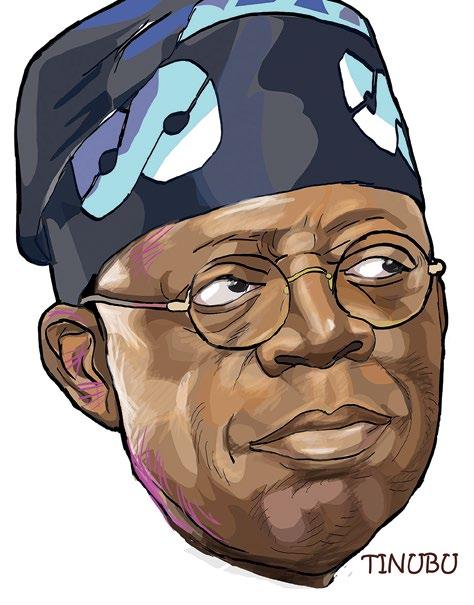
technology and setting up neutral oversight bodies could help curb fraud and increase voter confidence. Additionally, a focused effort on encouraging voter turnout in the U.S. by removing barriers to voting—through mail-in ballots, early voting and robust voter education campaigns—proved effective. For Nigeria, restoring confidence in the system through transparency and accountability, simplifying the voting process, expanding voter registration and educating citizens on the importance of participating in elections could counteract voter apathy.
Moreover, the American election demonstrated the value of clear legal guidelines on handling electoral disputes. By
establishing and enforcing transparent protocols, Nigeria could reduce the litigious nature of its elections, ensuring smoother transitions and less volatility. These reforms, supported by strong civic education and an inclusive political environment, could be essential in preparing Nigeria for a fairer and more credible elections that will come between now and the general elections in 2027 by which time Nigerians will be fully confident that their votes will count.
To mitigate the economic discontent that fueled Trump’s success, I urge the Nigerian Government to commit to comprehensive reforms that address the root causes of inflation, unemployment, and inequality. Enabling an environment that encourages investments in domestic agriculture, infrastructure, curbing insecurity and power supply could help alleviate the cost-of-living pressures that have eroded public trust. Transparent and effective implementation of these policies, with clear communication to the citizenry, will be crucial in restoring confidence in the government’s ability to manage the economy.
Nigerian political leaders must also resist the temptation to employ divisive narratives that appeal to ethnic, regional or religious loyalties. Instead, they should prioritise policy-driven discourse that focuses on addressing the genuine concerns of all Nigerians in ways that put food on their tables and monies in their pockets, regardless of their background. Fostering a more inclusive political environment, where diverse voices are heard and represented, can help bridge the societal divisions that continue to undermine national unity. It cannot be hard to see that most Nigerians whether living at home or abroad seek a country that is progressive and works well for everyone, irrespective of tribe or gender. We can start rebuilding by drawing on the American experience by prioritising reforms that enhance the transparency, accessibility, and security of the electoral process. When we get our electoral process right, where the will of the people prevail at the polls, we will begin to witness the journey to a prosperous country where the best of our people seek elective office and in turn deliver economic prosperity for all.
We are all hurting from the current economic crisis and the government at all levels should urgently address the major issues behind the crisis re: Insecurity, stunted crude oil production, corruption and low food production amongst others.
It cannot be hard to see that most Nigerians whether living at home or abroad seek a country that is progressive and works well for everyone, irrespective of tribe or gender. We can start rebuilding by drawing on the American experience by prioritising reforms that enhance the transparency, accessibility, and security of the electoral process